From the moment we landed in Cebu, we had a feeling it was going to be special.
But it wasn’t just the canyoneering and whale shark watching that won us over. As we explored more of the island, we found limestone cliffs rising above crystal-clear waters, locals who made us feel at home, and milky ‘Blue Cebu’ waterfalls.
It’s the kind of place that sticks with you.
In this guide, we’ll share all our best Cebu tourist spots and the best things to do in Cebu. After reading through this list, you’ll understand why it’s the place that made us fall in love with the Philippines.
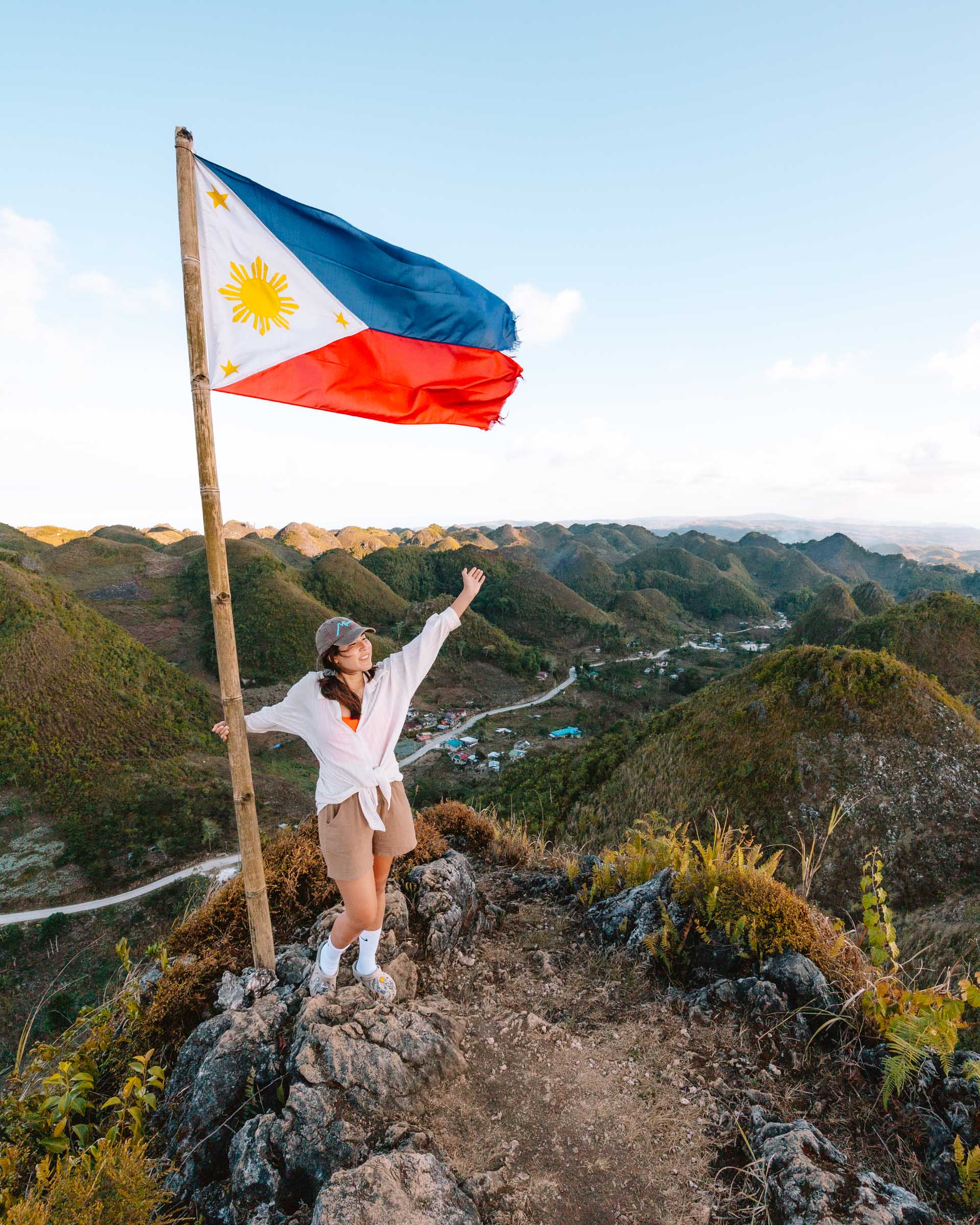
15 Incredible Things to Do in Cebu
Kawasan Falls Canyoneering
I’ll admit, I thought that Kawasan Falls Canyoneering would be overrated — until we did it ourselves. I can now say that it is without a doubt one of the top things to do in Cebu.
As we made our way through the canyon, we jumped, slid, swam, and scrambled over rocks. Basically every possible way to move through a watery gorge.
Beyond the adrenaline-fueled jumps, the canyon itself is just incredible. At one point, as we floated through the gorge, I paused to take it all in. Towering limestone cliffs rose above us, covered in vines and ferns, blocking out most of the sunlight.
It’s one of those places that you can’t believe even exists.
But what most people don’t realize is that there are two different canyoneering routes to Kawasan Falls, and your experience can vary dramatically depending on which route you choose—and even what time of day you go.
Read our full blog post: Kawasan Falls Canyoneering: Complete Guide
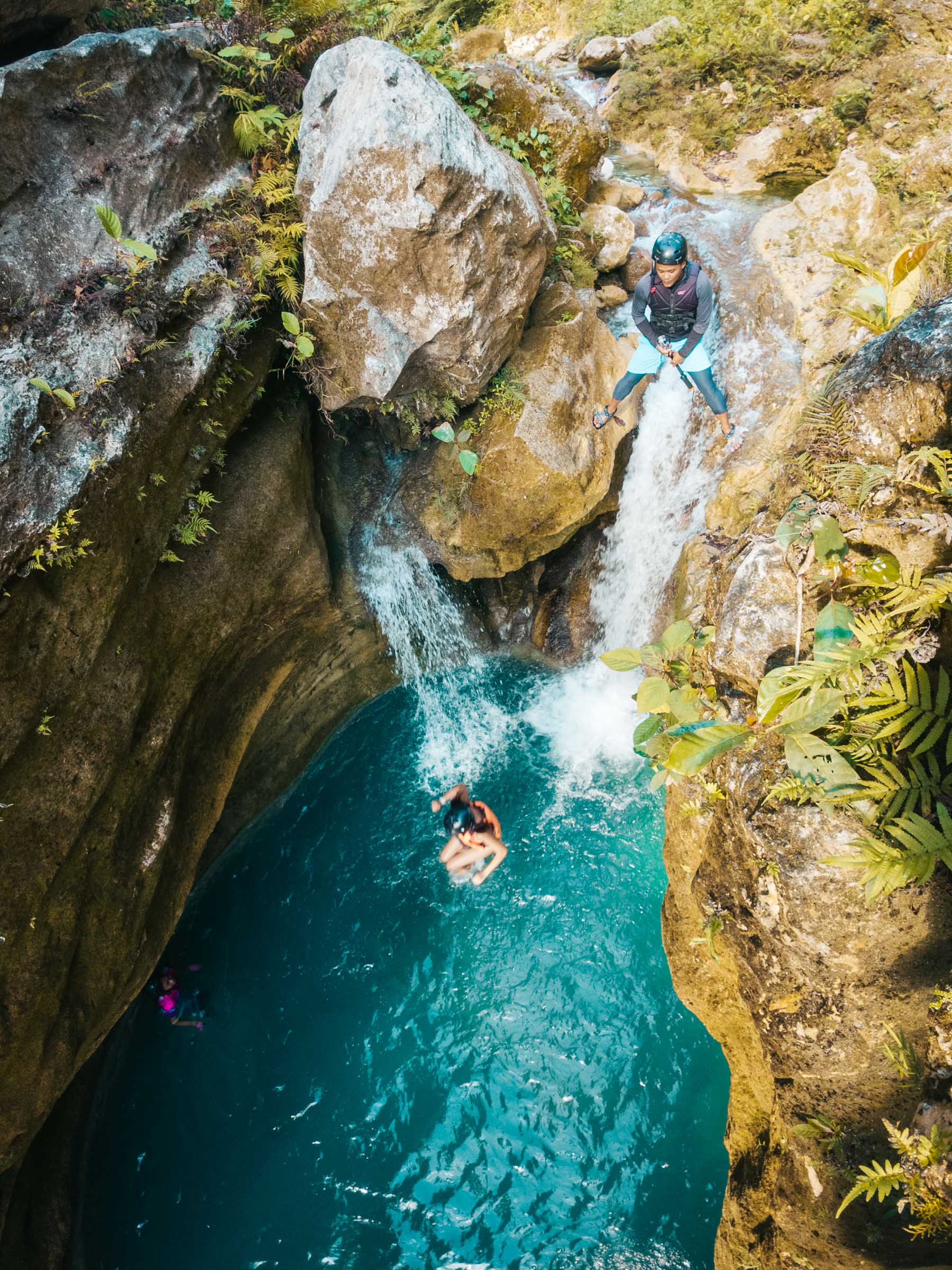
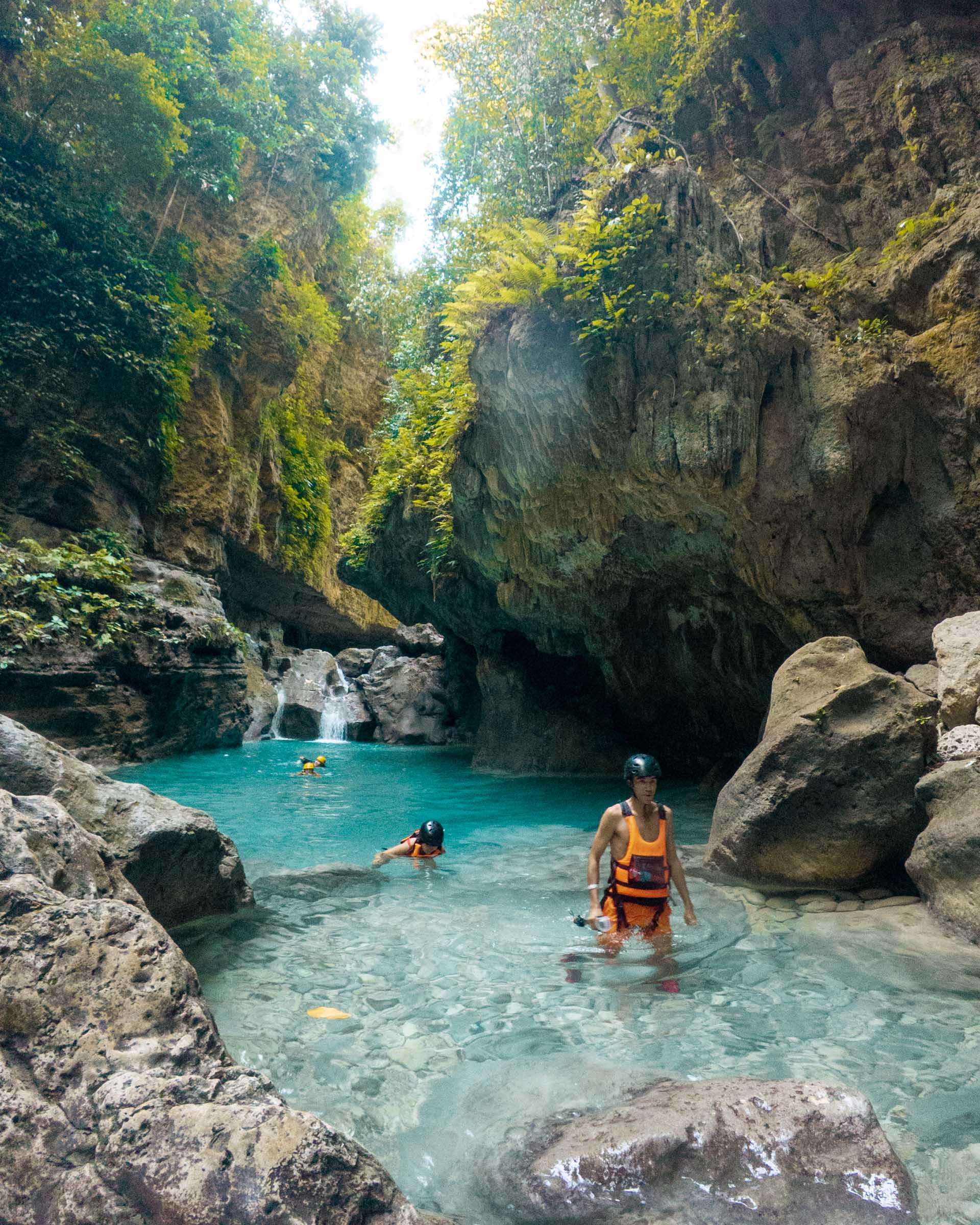
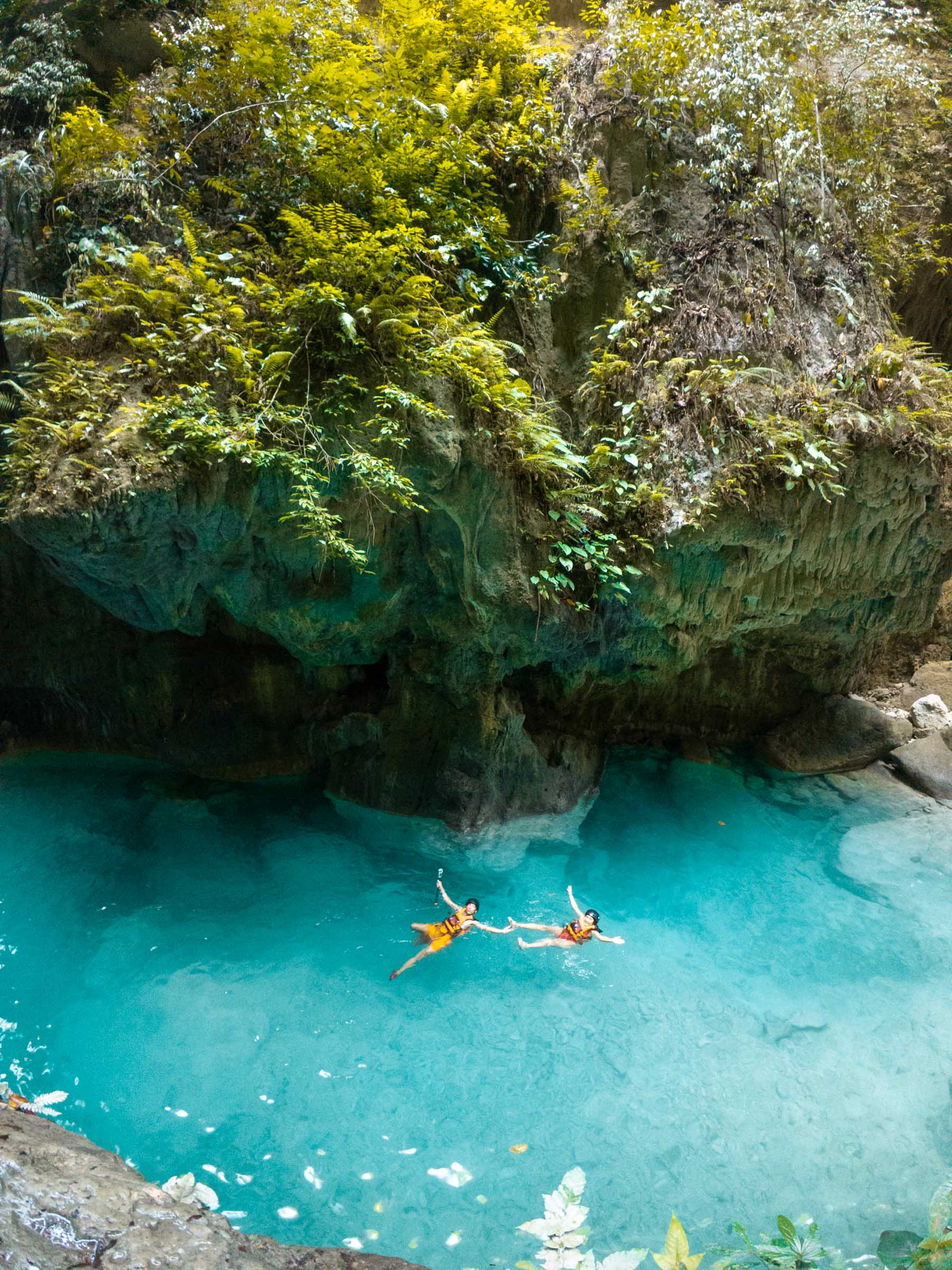
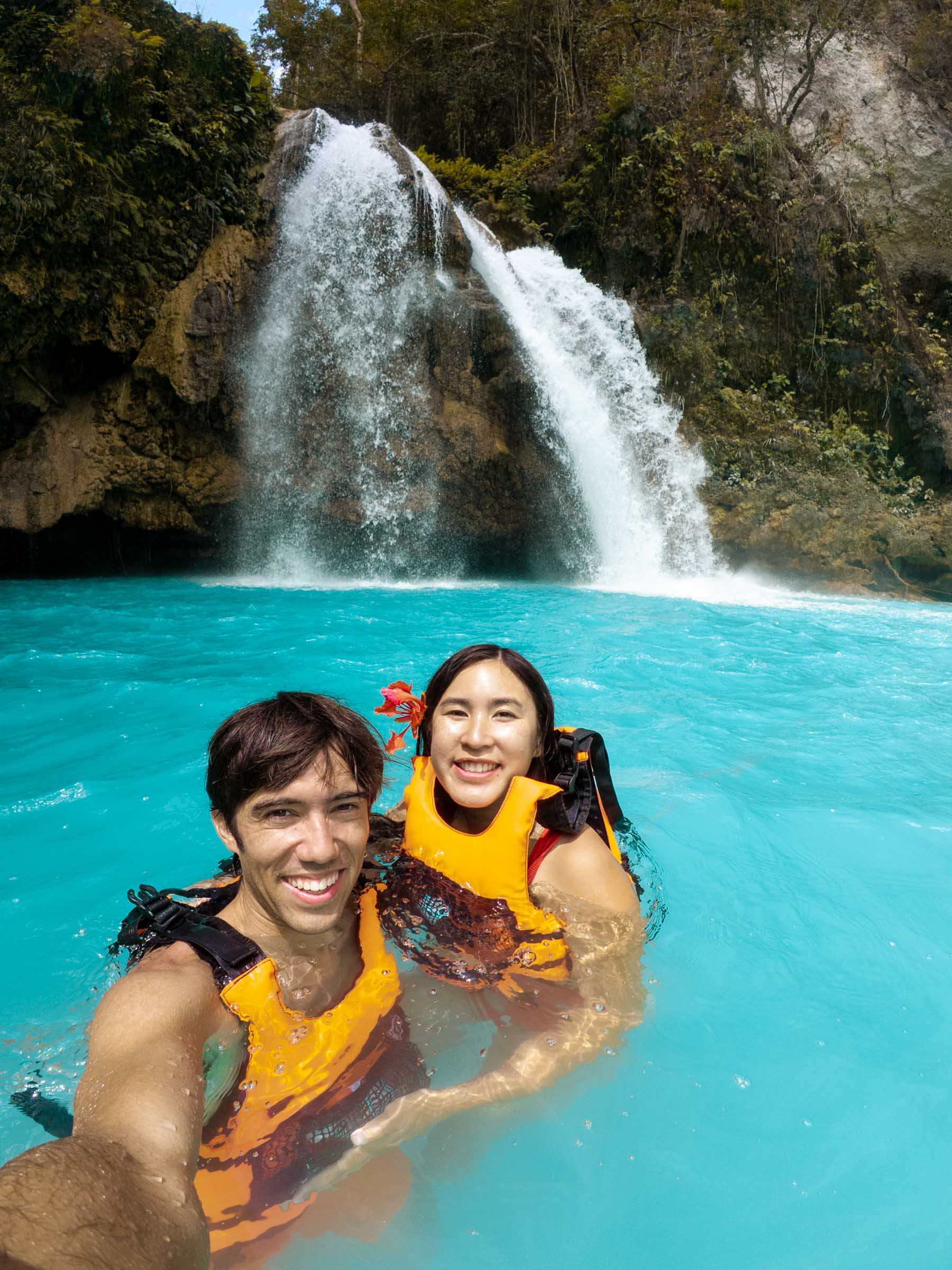
Whale Shark Watching
Swimming with whale sharks in Oslob is a surreal, once-in-a-lifetime experience. These gentle giants glide effortlessly through the water, giving you an up-close encounter you won’t forget.
The Oslob whale shark watching tours start early in the morning. You’ll board a small paddle boat and head a couple hundred meters offshore to the designated dive site. Once there, you’ll put on a snorkel, jump into the ocean, and find yourself face-to-face with these incredible creatures.
I won’t lie, those first few moments swimming with the whale sharks were intense. I’ve done plenty of snorkeling before, but I’ve always been the biggest creature in the water. Not this time. Not even close.
In the past, whale shark watching in Oslob was a bit of a wild-west situation, with little regulation. Now, the government has stepped in, enforcing rules and educating visitors to minimize harm to the whale sharks. While it’s not a perfect system, it’s significantly more structured and responsible than before.
Read our full blog post: Oslob Whale Shark Watching: Complete Guide
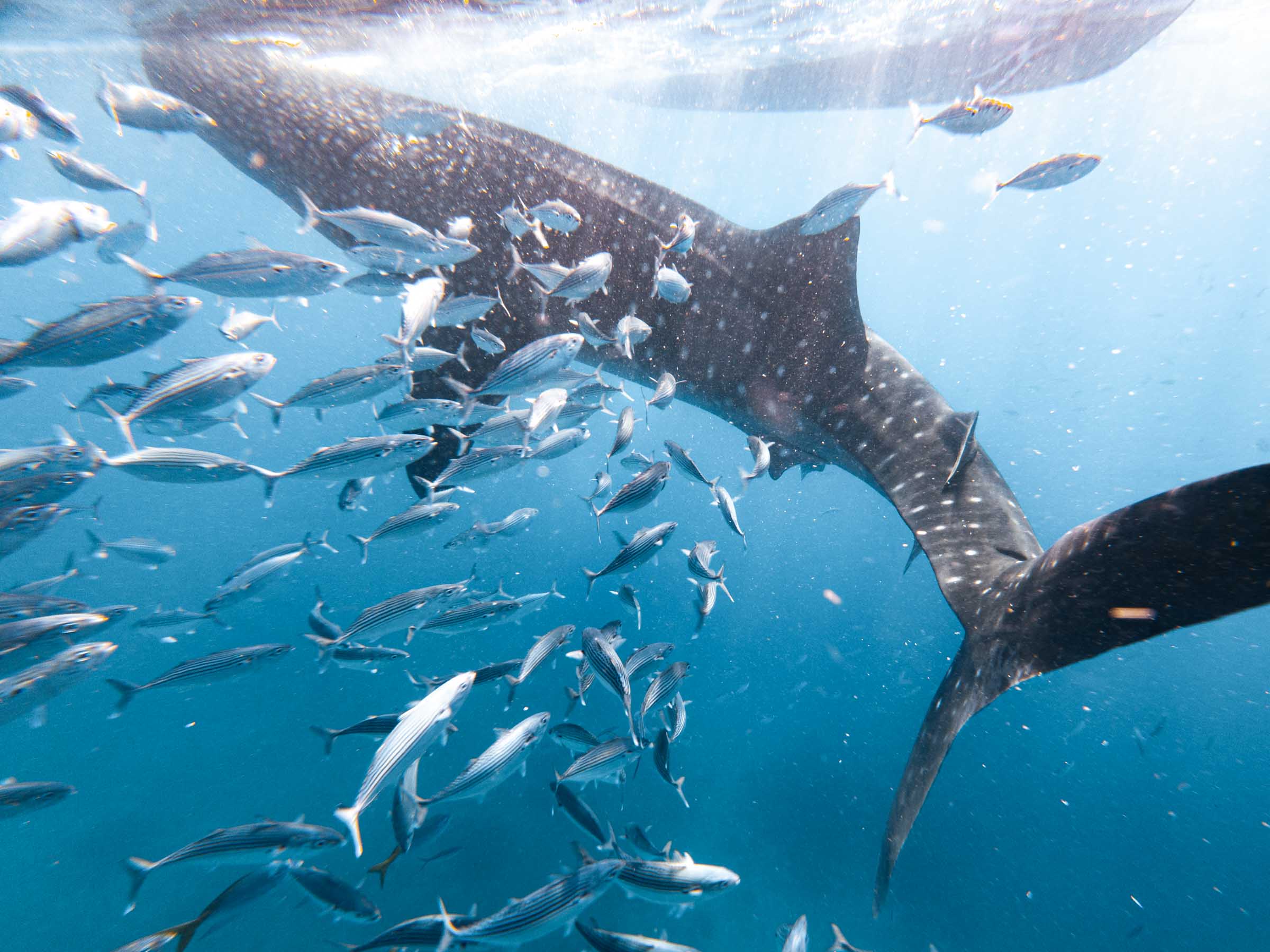
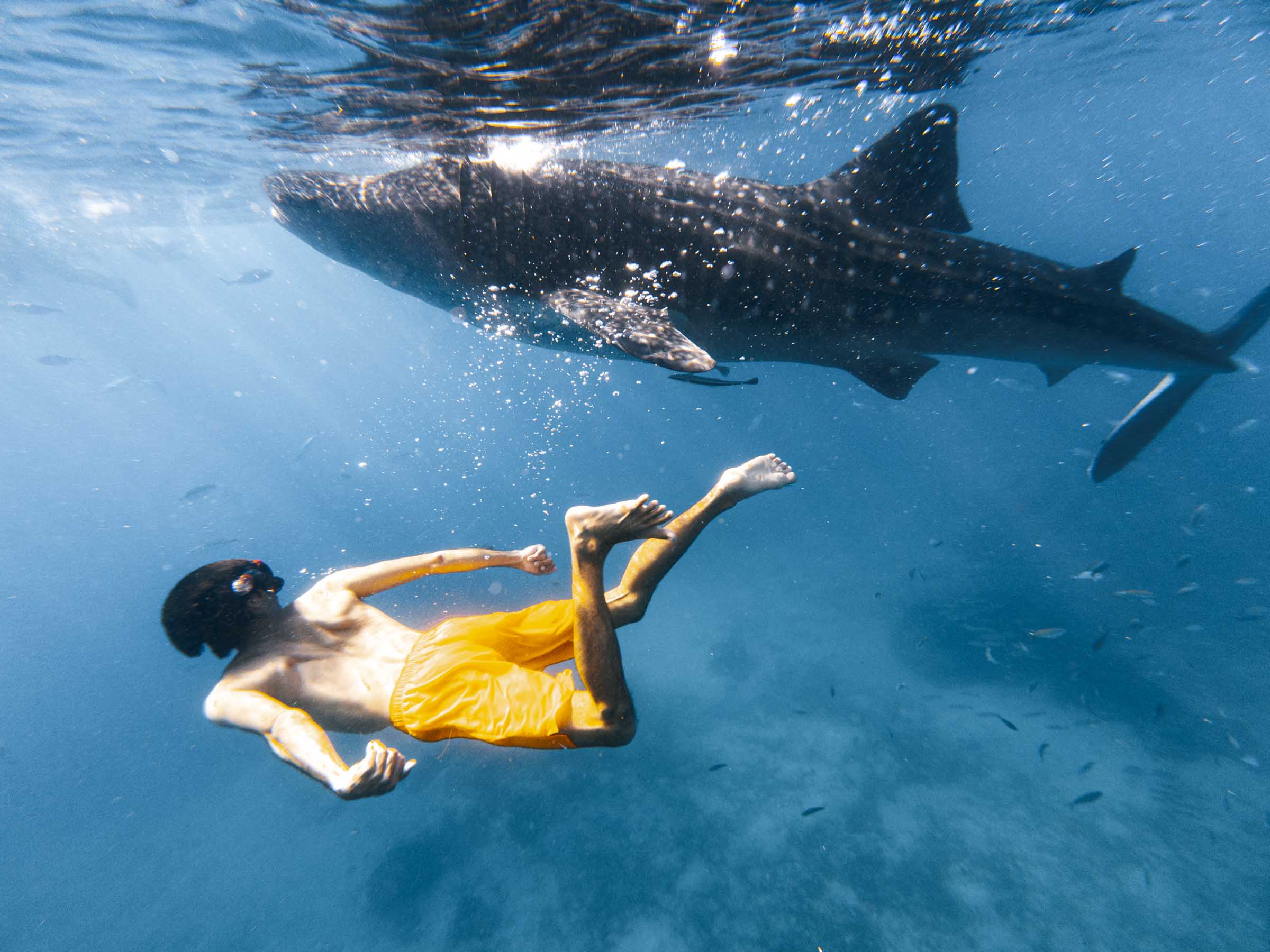
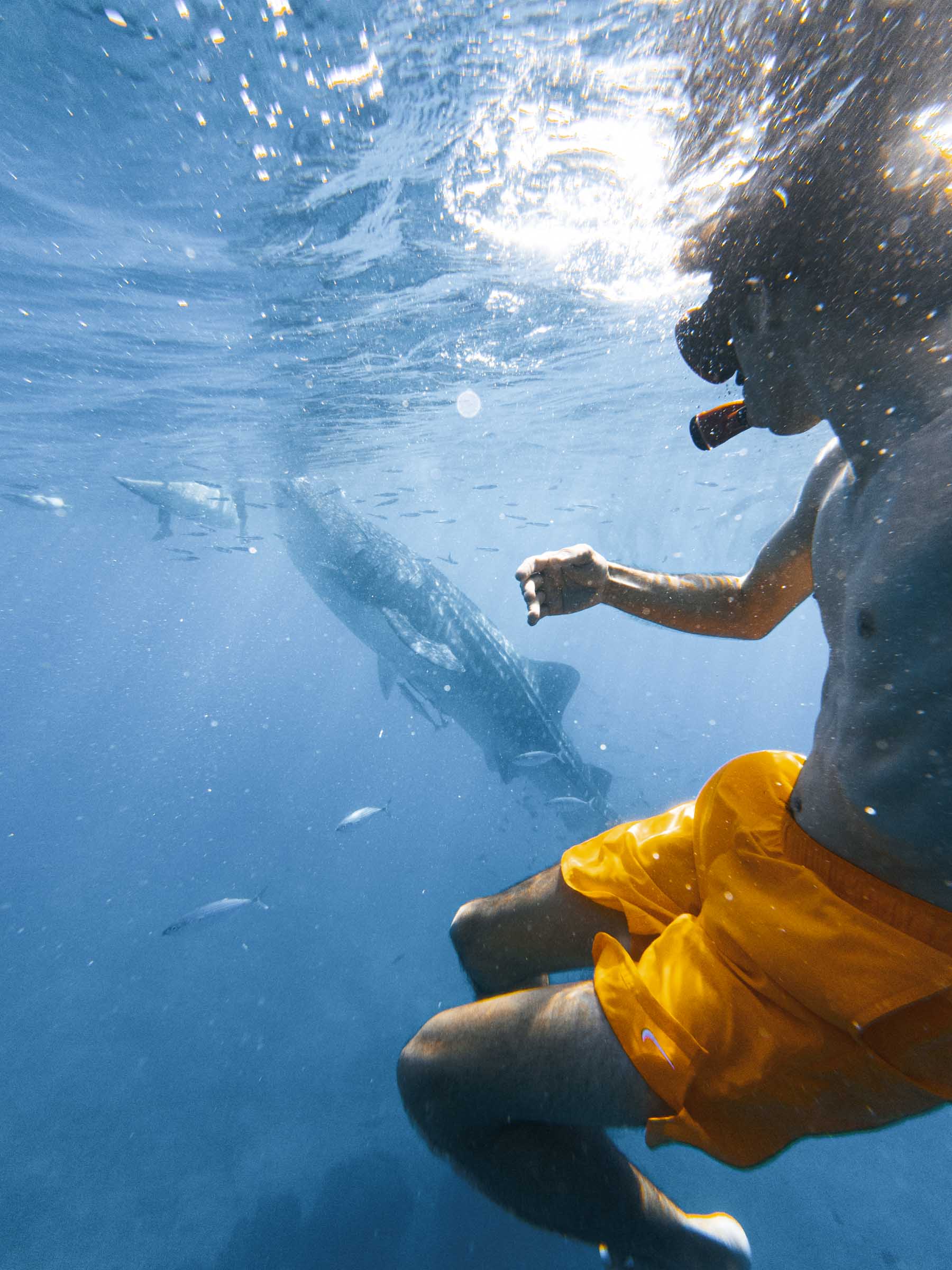
Inambakan Falls
Inambakan Falls is easily one of the top waterfalls to visit in Cebu.
But while most people only visit Inambakan’s main waterfall, there’s a lot more to it than meets the eye.
Hidden behind the main falls is an entire canyon system with four more waterfalls. Each waterfall is an adventure in itself, with caves, cliff jumps, and milky blue pools of water. It’s an insane place for exploration.
Two of the hidden waterfalls have cliff jumps, and one hides a secret cave.
But the final waterfall is a true hidden gem. A narrow limestone gorge leads to the falls, where you wade through the signature milky blue Cebu water. That last waterfall alone makes the trip more than worth it, and in my opinion, it’s more epic than the main falls itself.
Read our full blog post: Inambakan Falls in Cebu: Complete Guide
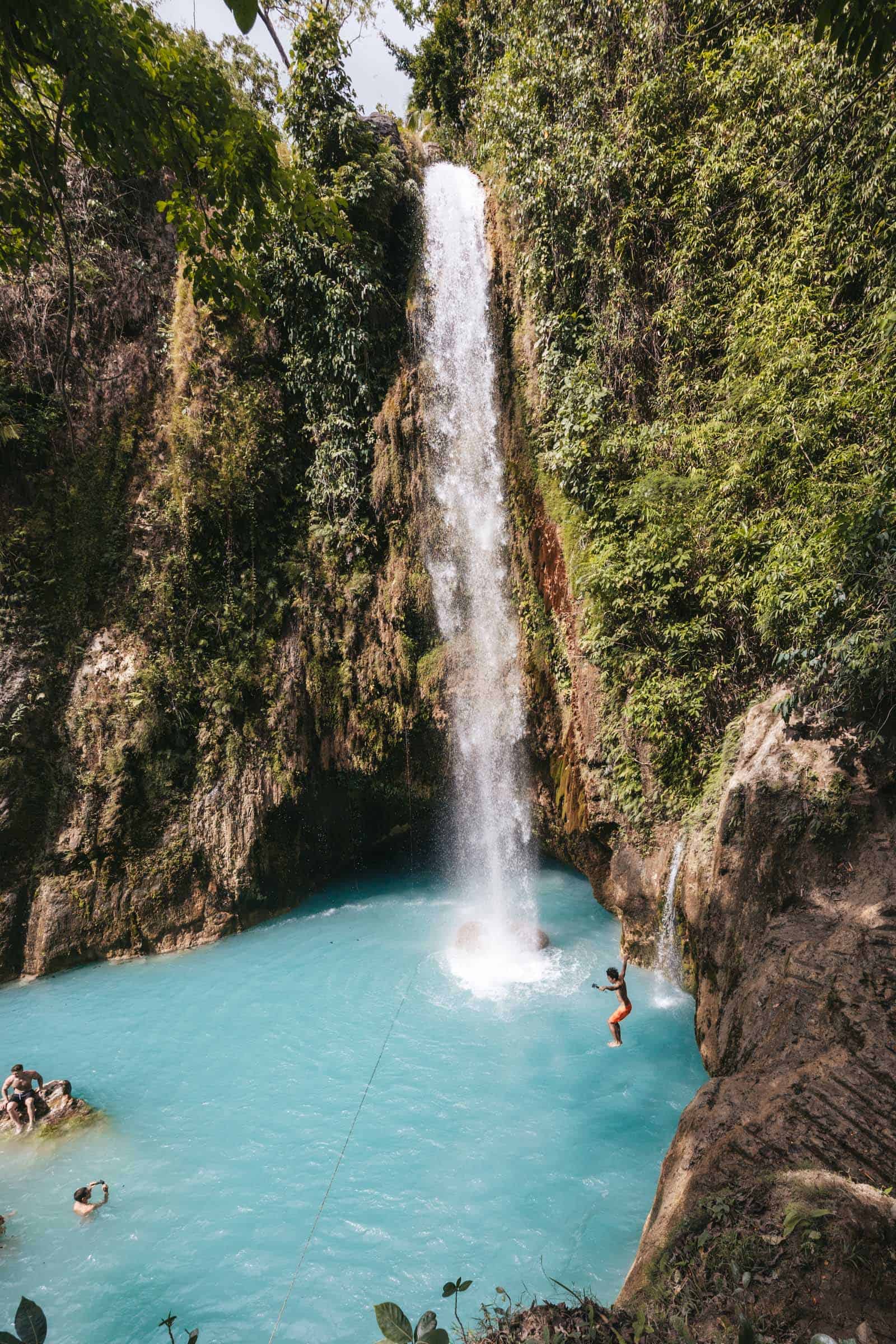
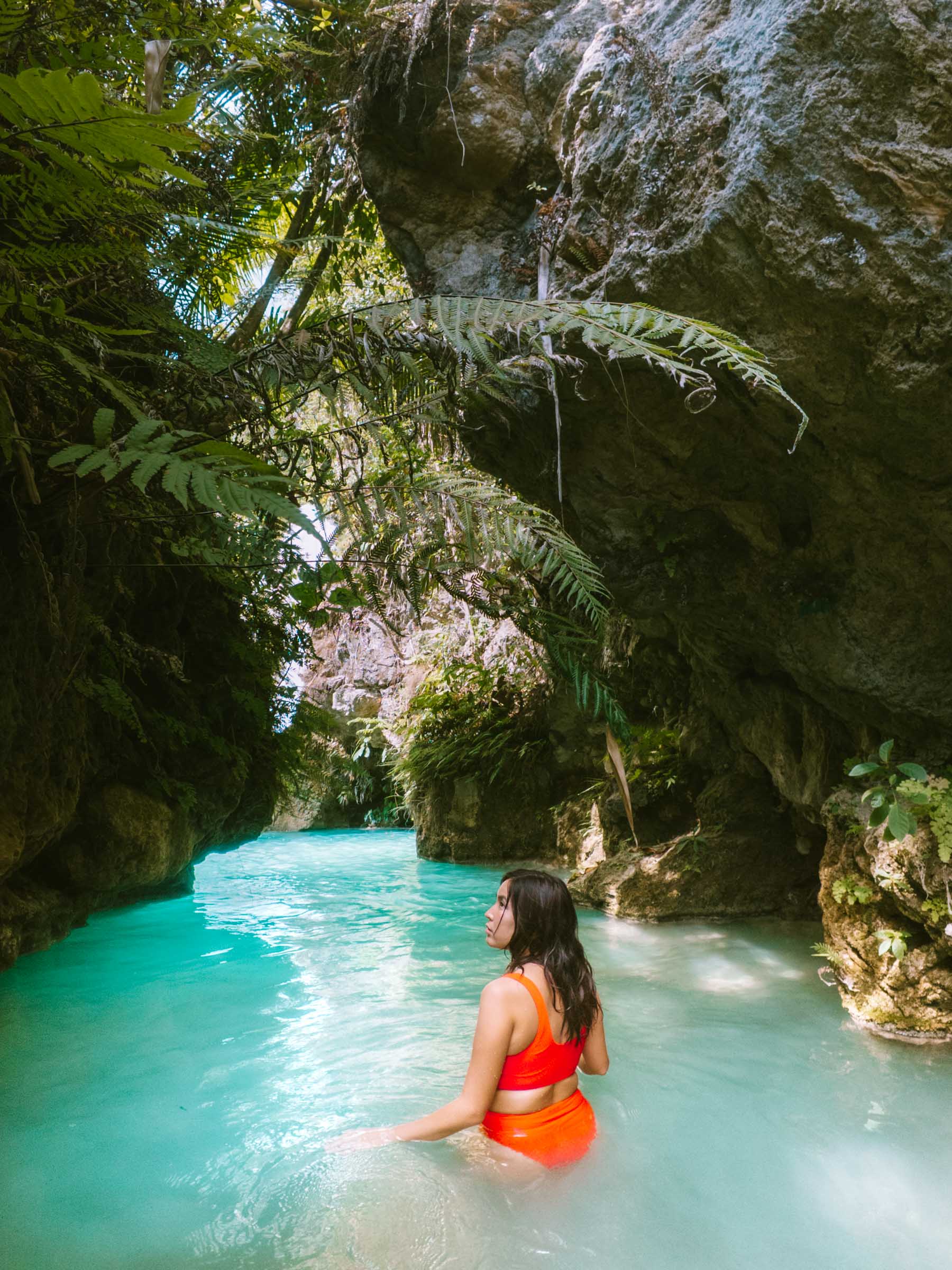
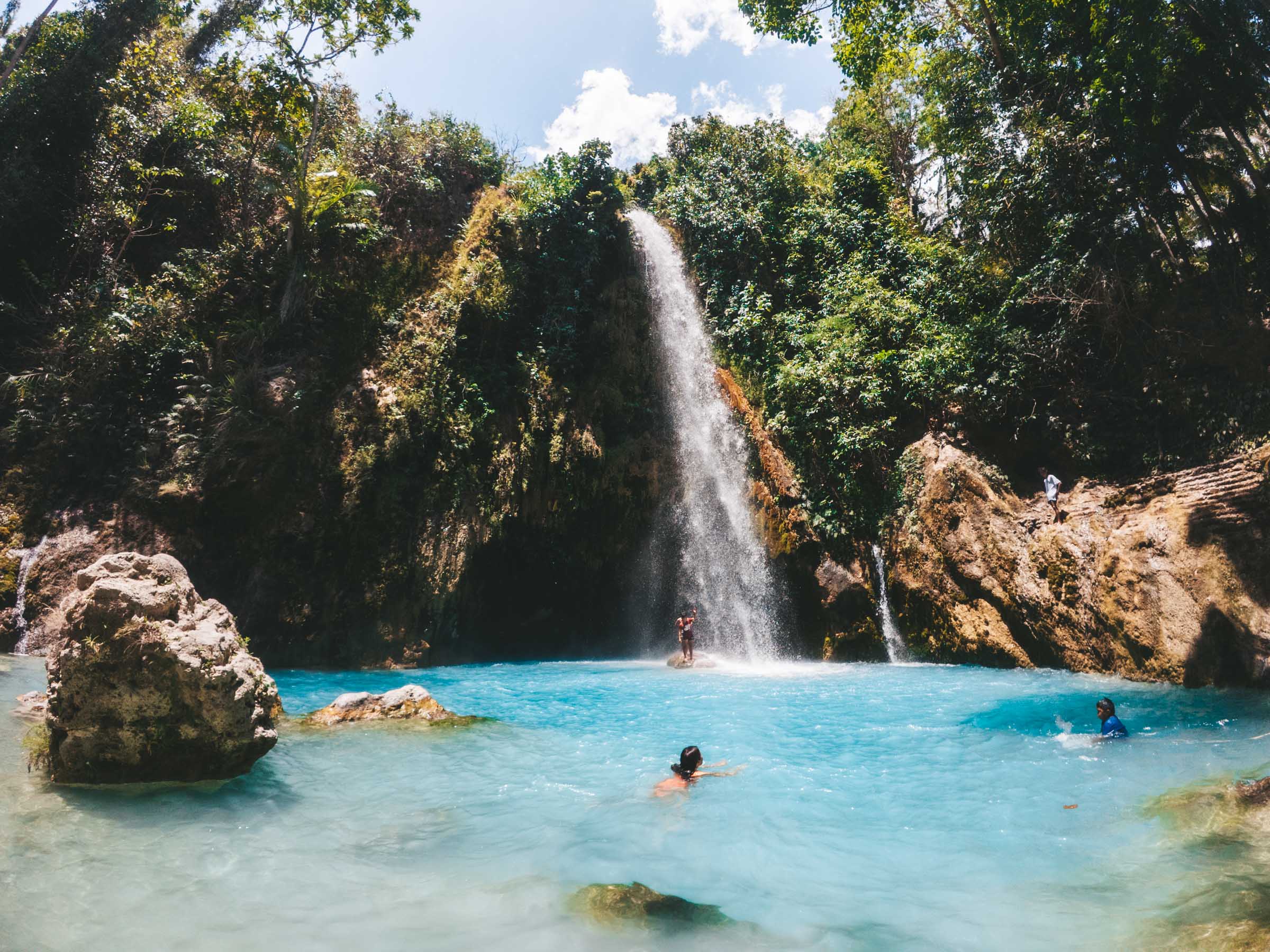
Casino Peak
Casino Peak is one of the most epic viewpoints in Cebu. It’s located just a short distance from the more famous Osmena Peak, but I think the views at Casino Peak are just as stunning—and it’s much less popular.
As you approach the summit, you’ll encounter some sections that require scrambling, so be prepared to use your hands for support in a few spots.
From the top of Casino Peak, I took a moment to look around. I saw all the neighboring peaks surrounding us, and the road below that we used to get here.
The views cascaded downhill—all the way to the ocean and as far as Moalboal. It’s always so cool to have such an insane view, because as far as we had come and how big the island felt, it all looked so small from up there.
Read our full blog post: Casino Peak in Cebu: Complete Guide


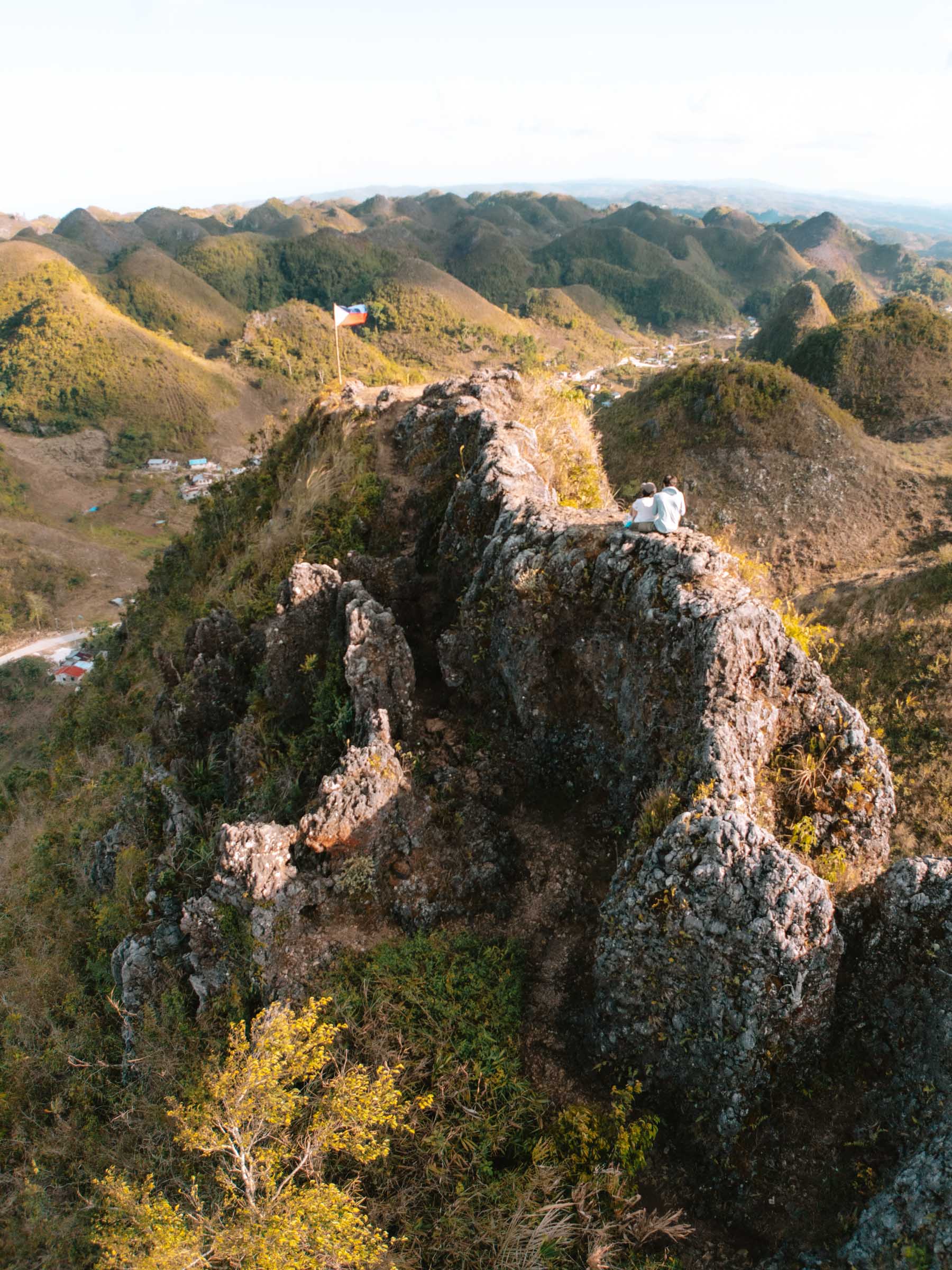
Our Free Cebu Google Maps Locations
Do you need a handy map with all our Cebu locations? We’ve got a Google Map with all the Cebu locations in this post (plus a LOT more). Sign up in the box below and we’ll deliver it right to your inbox, plus our top tips to help you plan your Cebu adventure.
Moalboal Sardine Run
The Sardine Run is one of Moalboal’s top things to do for nearly every traveler who visits this coastal town in Cebu.
But despite the name, it’s not a run at all—it’s a swim.
Just off Panagsama Beach, massive schools of sardines gather in shimmering, ever-shifting formations. As you swim among them, thousands of fish move in perfect synchrony, twisting and swirling as if they were a single living entity.
It’s a mesmerizing experience and one of the easiest ways to witness an underwater spectacle without needing a boat or scuba gear.
Best of all, you don’t need to hire a guide to find the Moalboal Sardine Run. The sardines are easy to find at Panagsama Beach. I explain exactly how in the link below.
Read our full blog post: How to See the Moalboal Sardine Run Without a Tour
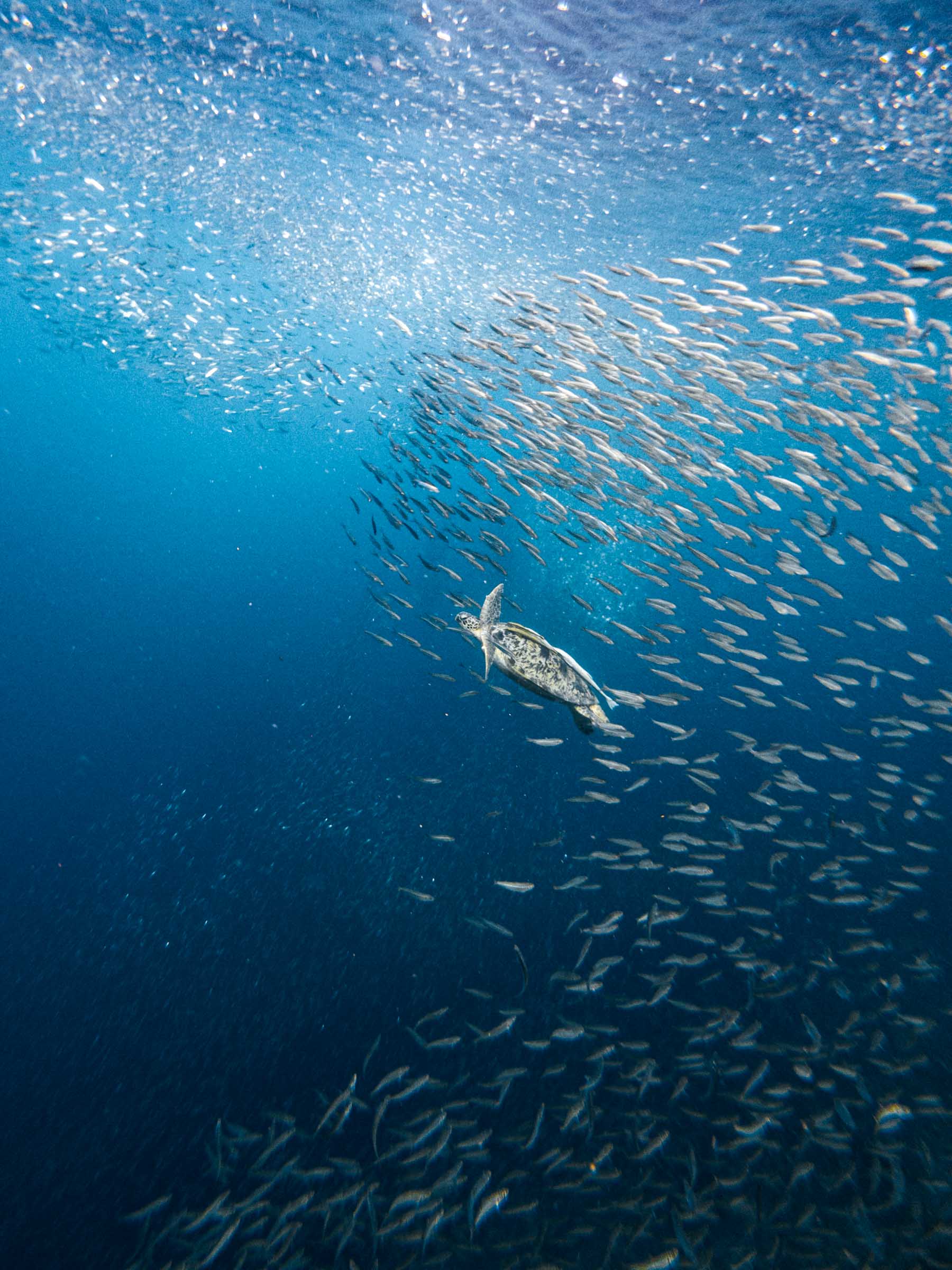
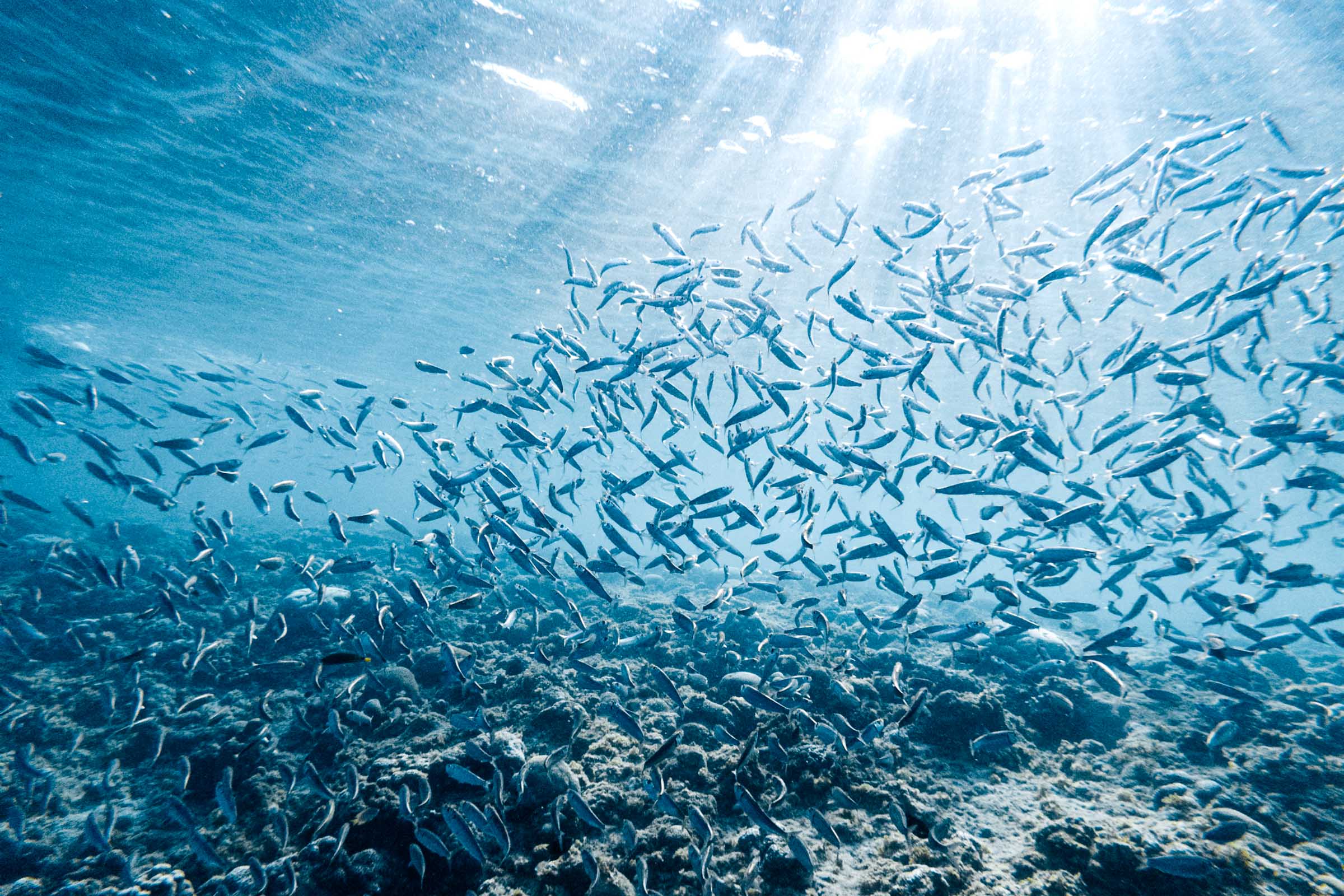
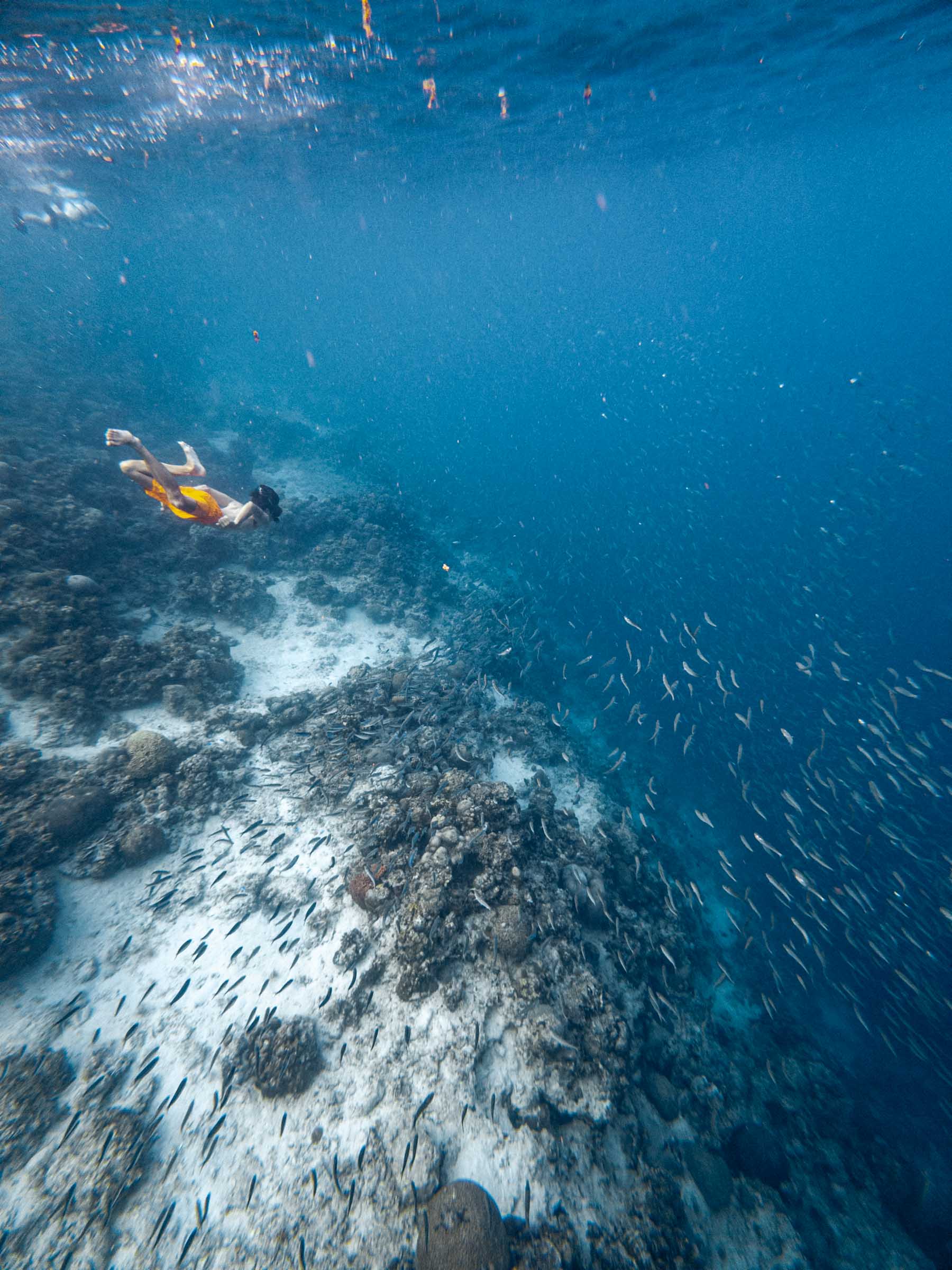
Binalayan Hidden Falls
Binalayan Hidden Falls is known for three distinct cascades flowing in unison like a claw over a cliff.
Though not exactly “hidden”, the Binalayan Hidden Falls have a way of feeling secluded.
During our visit, our guide showed us one of the coolest cliff jumping spots we’ve been to. He called it the “keyhole” since it was a hole carved out from behind the waterfall.
Getting to the keyhole required a bit of rock climbing, but our guide carefully helped me get in there, from where I jumped out into the basin below.
Read our full blog post: Binalayan Hidden Falls in Cebu: Complete Guide
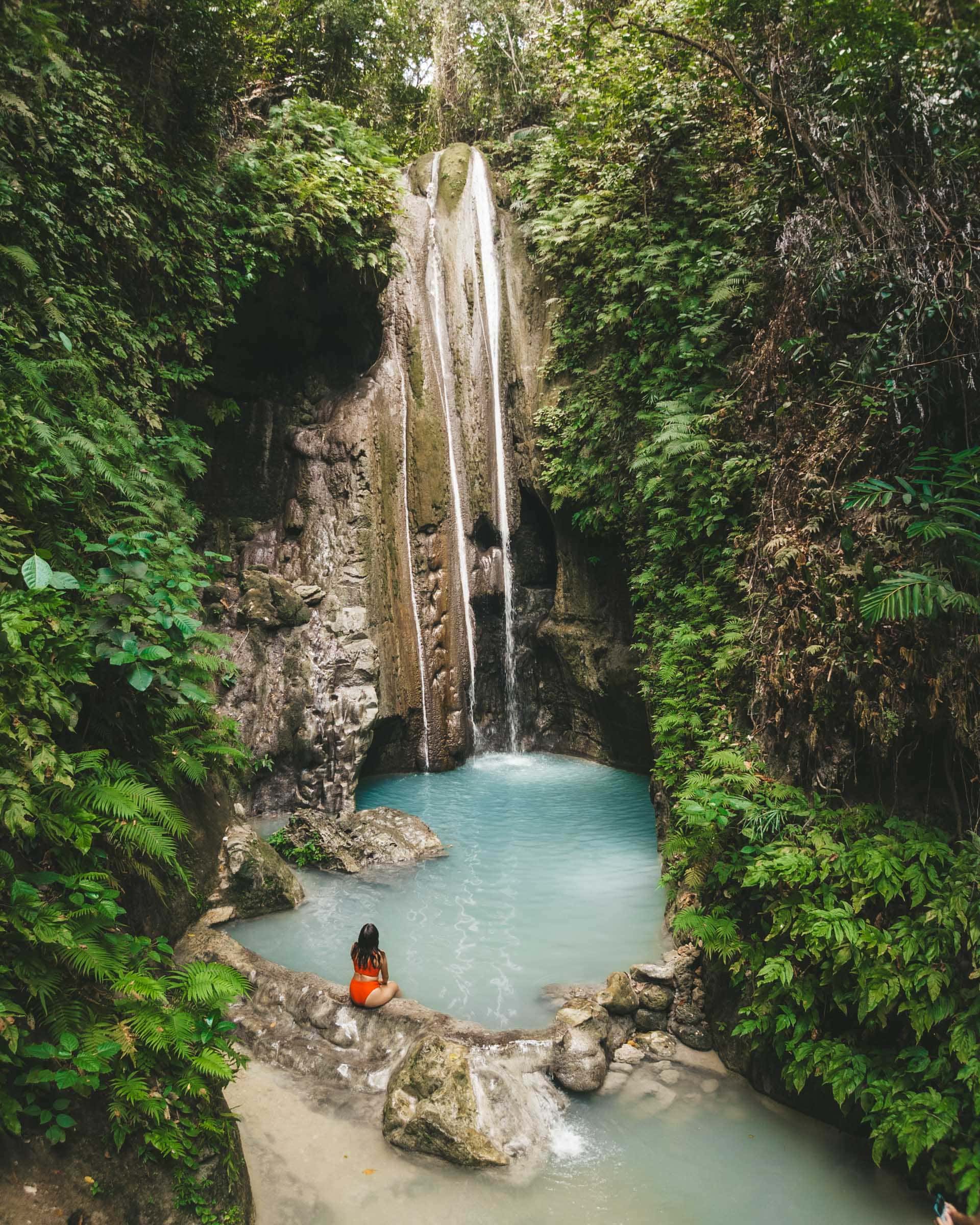
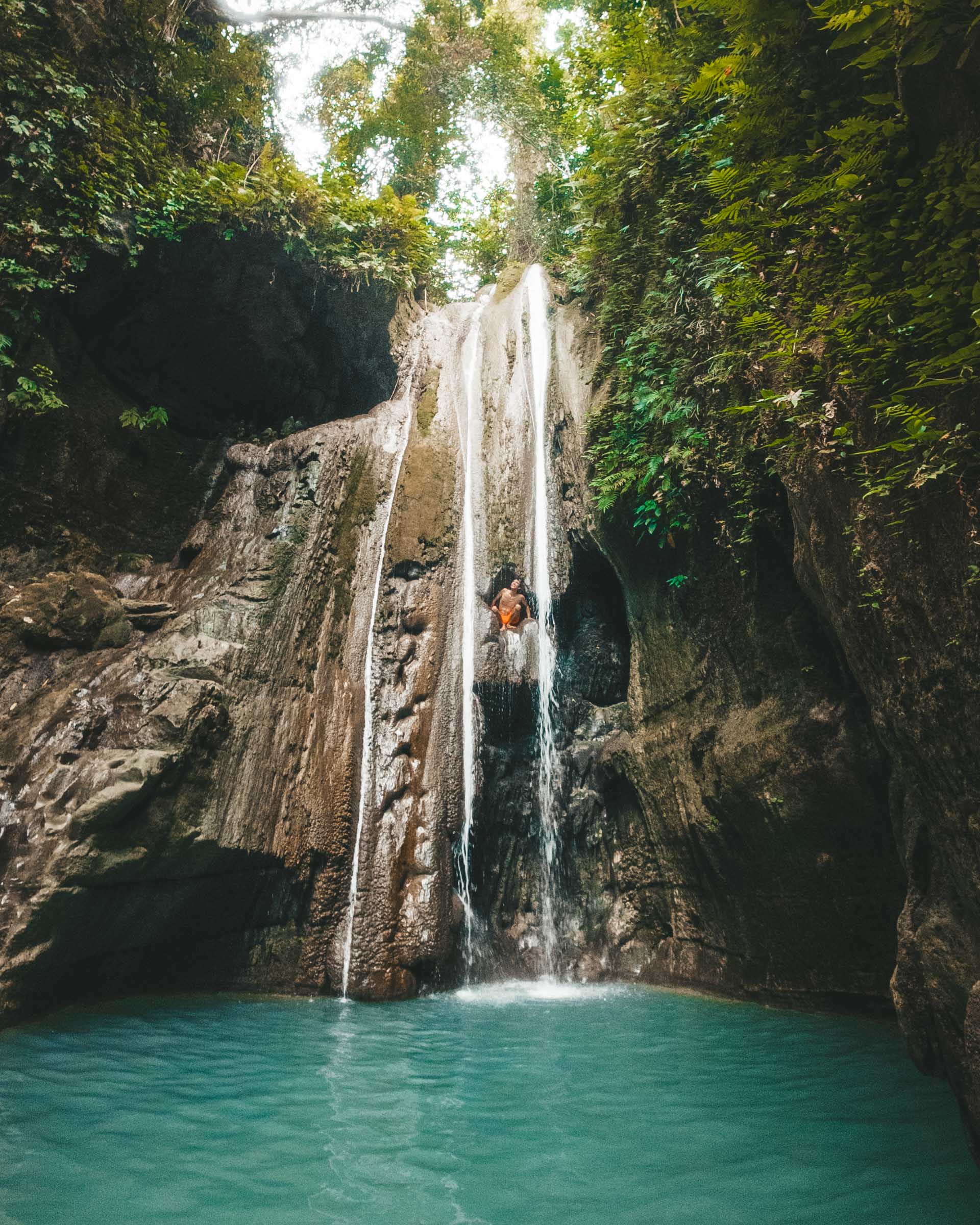
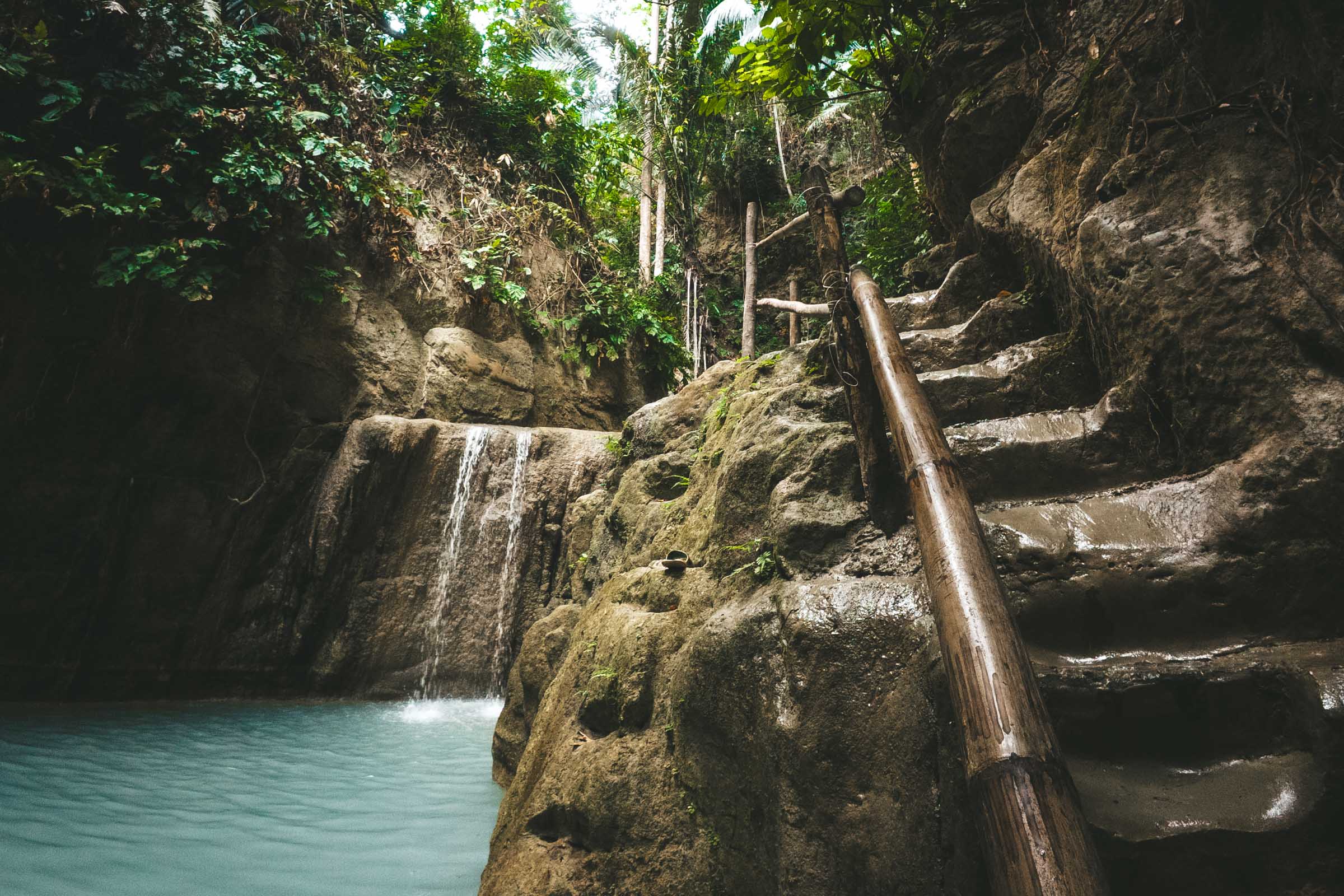
Mainit Hot Spring
Mainit Hot Spring consists of four concrete hot spring pools set within a river, surrounded by tropical foliage and a towering limestone cliff.
The pools vary slightly in temperature, with the upper ones being the hottest as they receive water directly from the spring. As the water flows downstream into the lower pools, it cools slightly before eventually emptying into the adjacent river.
To fully enjoy the experience, I found that alternating between the hot pools and the cool river was the best approach. The contrast between the steaming hot spring pools and the cool river made for an intense experience.
Read our full blog post: Mainit Hot Spring in Cebu: Complete Guide
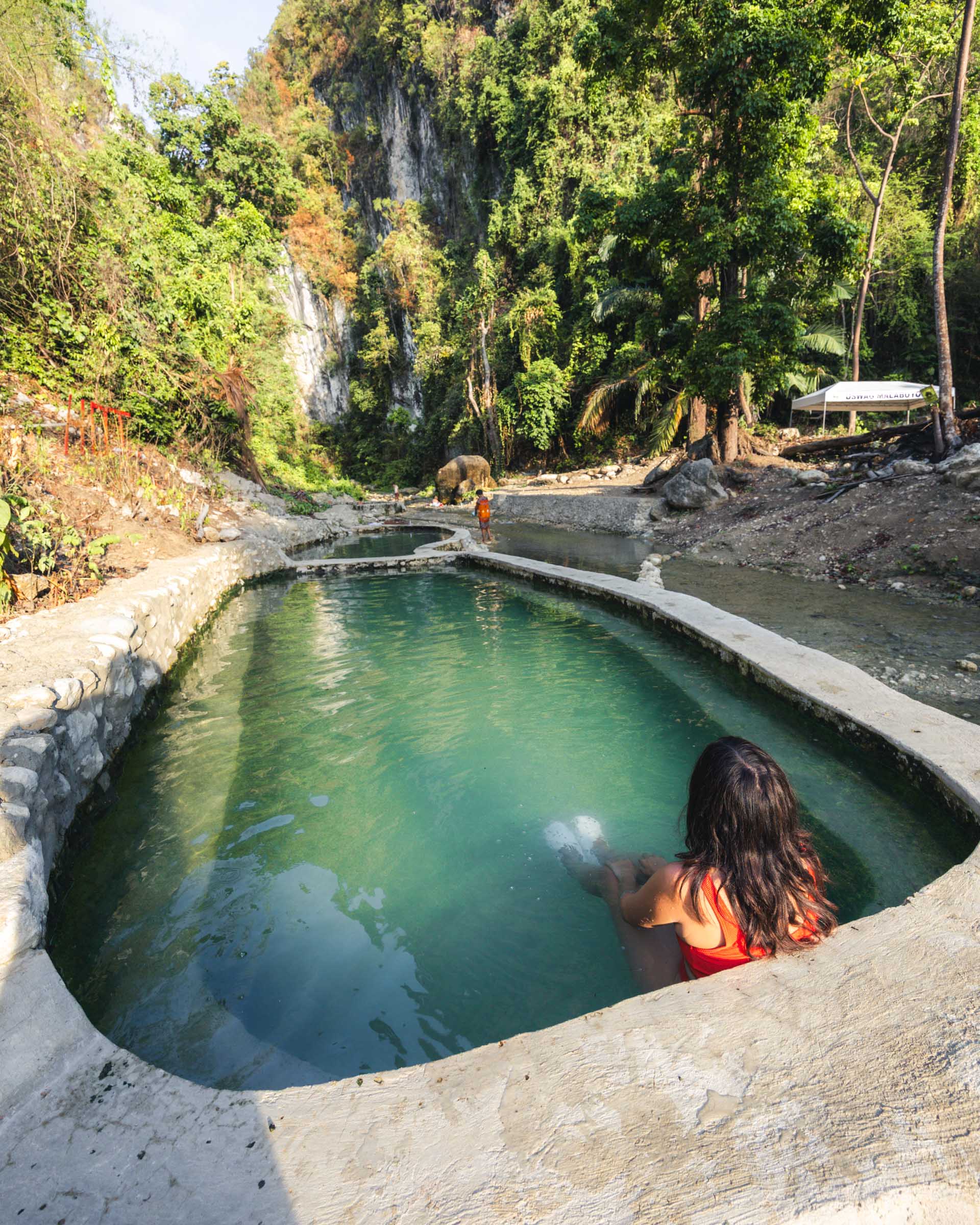
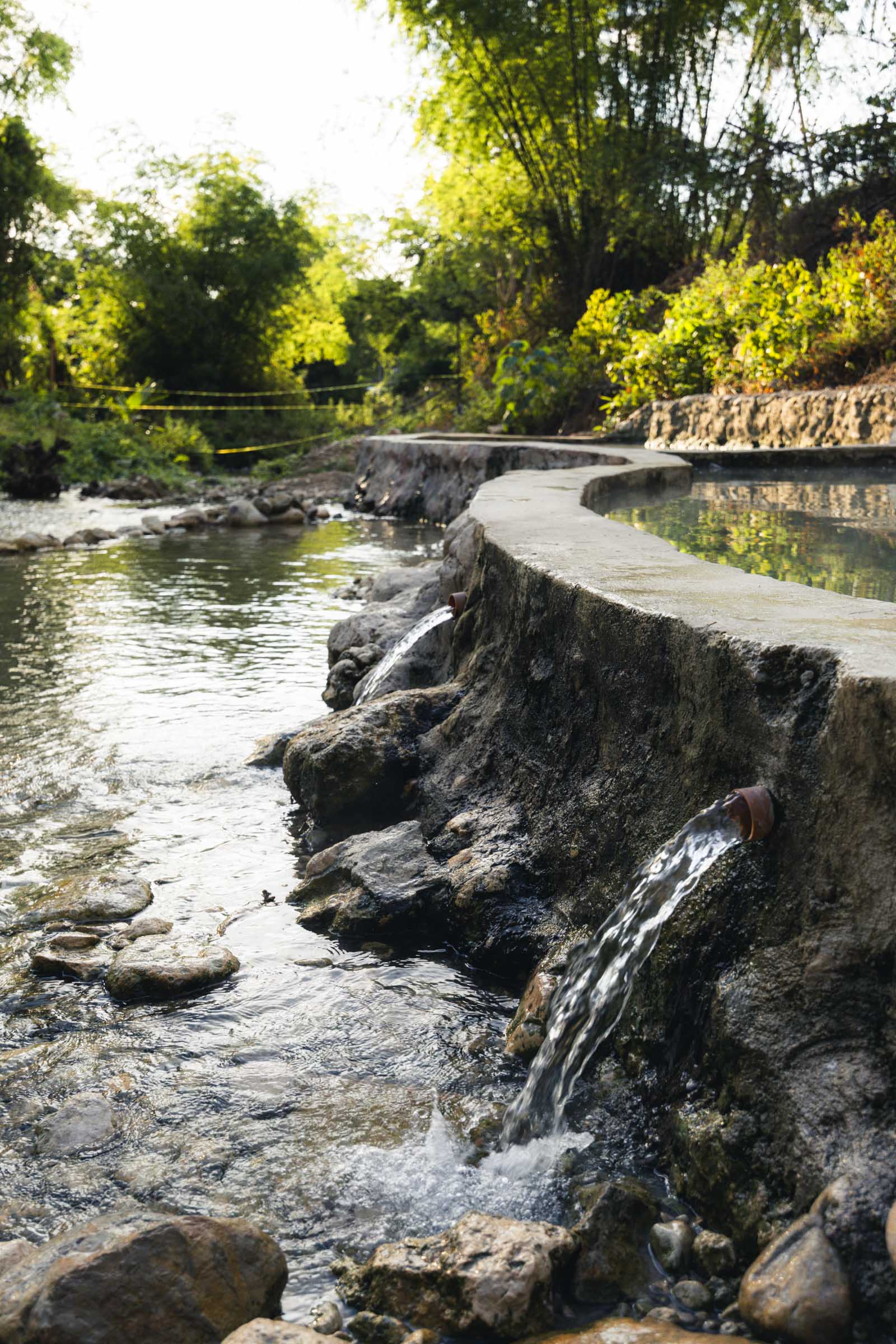
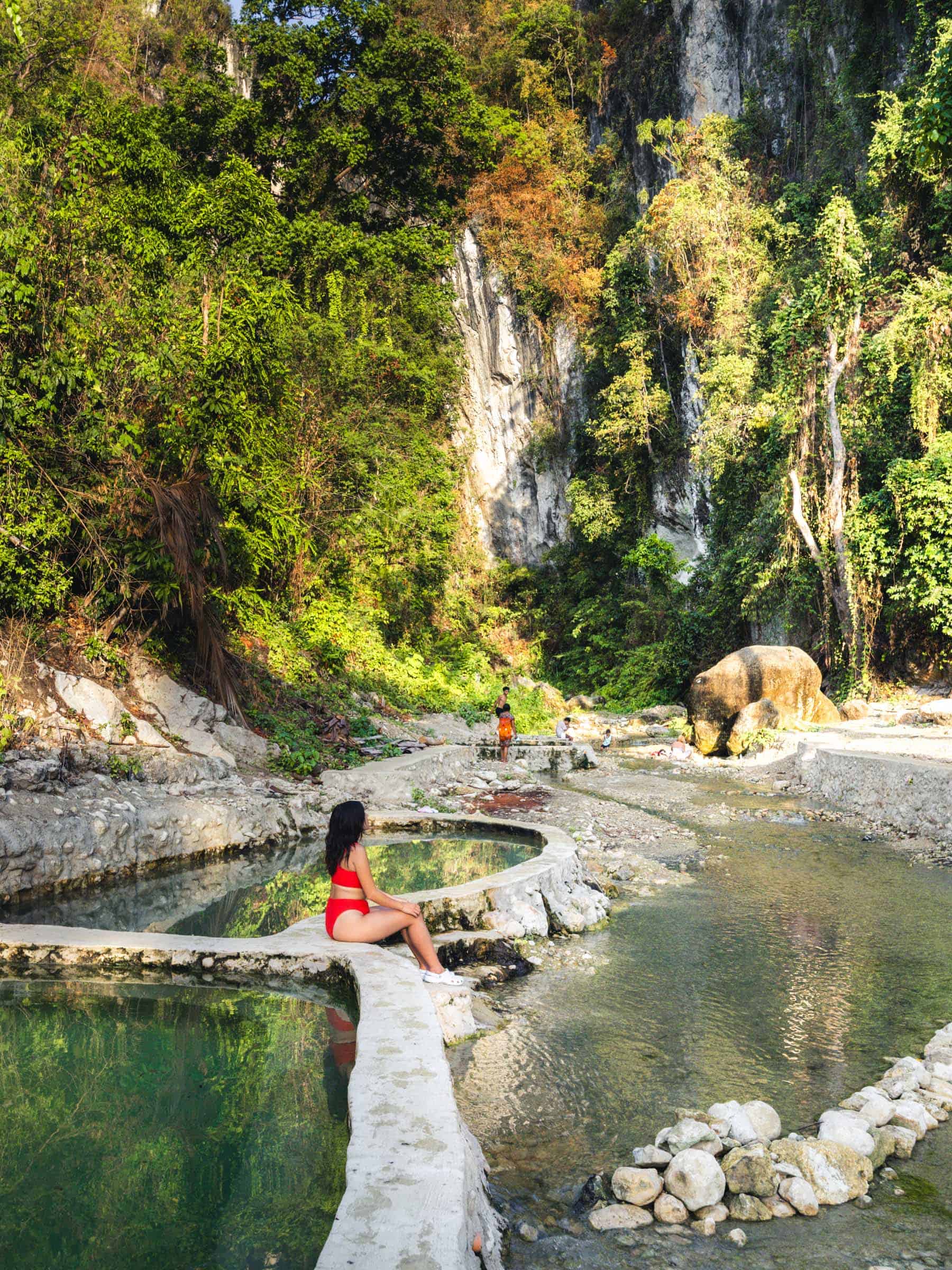
Cancalanog Falls
Cancalanog Falls is more of a natural swimming hole than a massive waterfall, but that’s exactly what makes it special. It’s tucked within a lush valley surrounded by trees and ferns.
The waterfall itself is tiny. In fact, it’s more of a gentle stream.
But Cancalanlog Falls has some of the clearest blue water we’ve seen, and its real attraction is its deep basin. If you love cliff jumping, you’ll find plenty of opportunities around the basin. The jumps range from small ledges to massive dives.
One jump, in particular, stood out.
A kid named Jake walked over to a rocky perch overlooking the pool. This was a massive jump, and he had to clear a good distance to land safely in the pool. No one else dared to try it.
Even the bamboo bridge across the river served as a jump, where a group of boys lined up to jump in all at once, creating a huge splash.
Read our full blog post: Cancalanog Falls in Cebu: Complete Guide
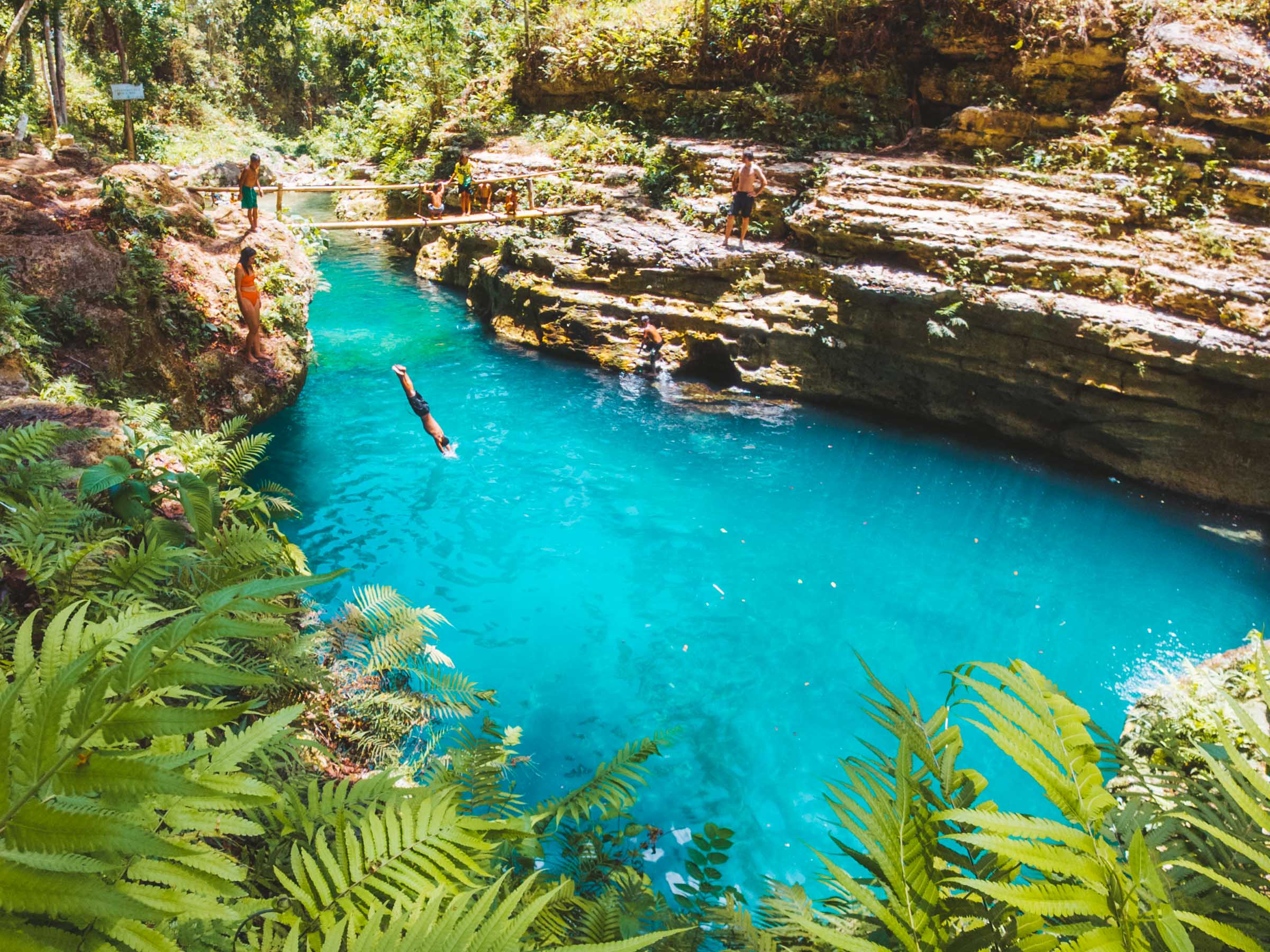

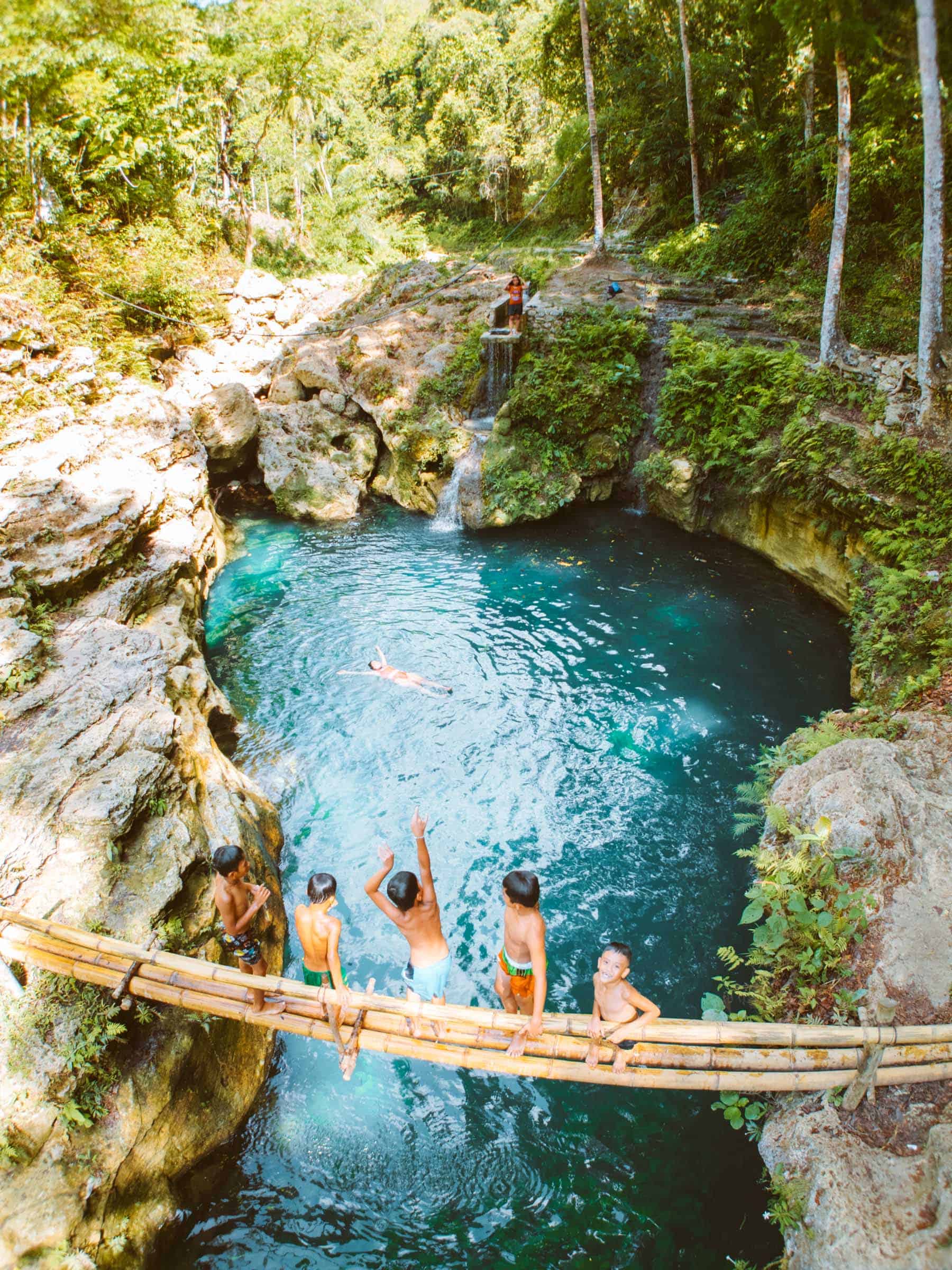
Kanlaob Falls
Kanlaob Falls is a small, hidden swimming area in Alegria, Cebu. Unlike the more famous waterfalls in the area, it remains relatively unknown. This makes for a relaxed experience—there are no mandatory guides, just a simple entrance fee before you walk in and explore.
During the dry season, the waterfall itself was little more than a trickle, gently cascading into a crystal-clear pool below. Despite its size, we had a great time swimming, cooling off, and chatting with the locals who were hanging out there.
Next to the falls is a bamboo ladder that goes up into a cave with a rope swing, which hangs from a tree inside. I took a few turns plunging into the refreshing water, while Chloe enjoyed wading along the rocky shore.
Read our full blog post: Kanlaob Falls in Cebu: Complete Guide
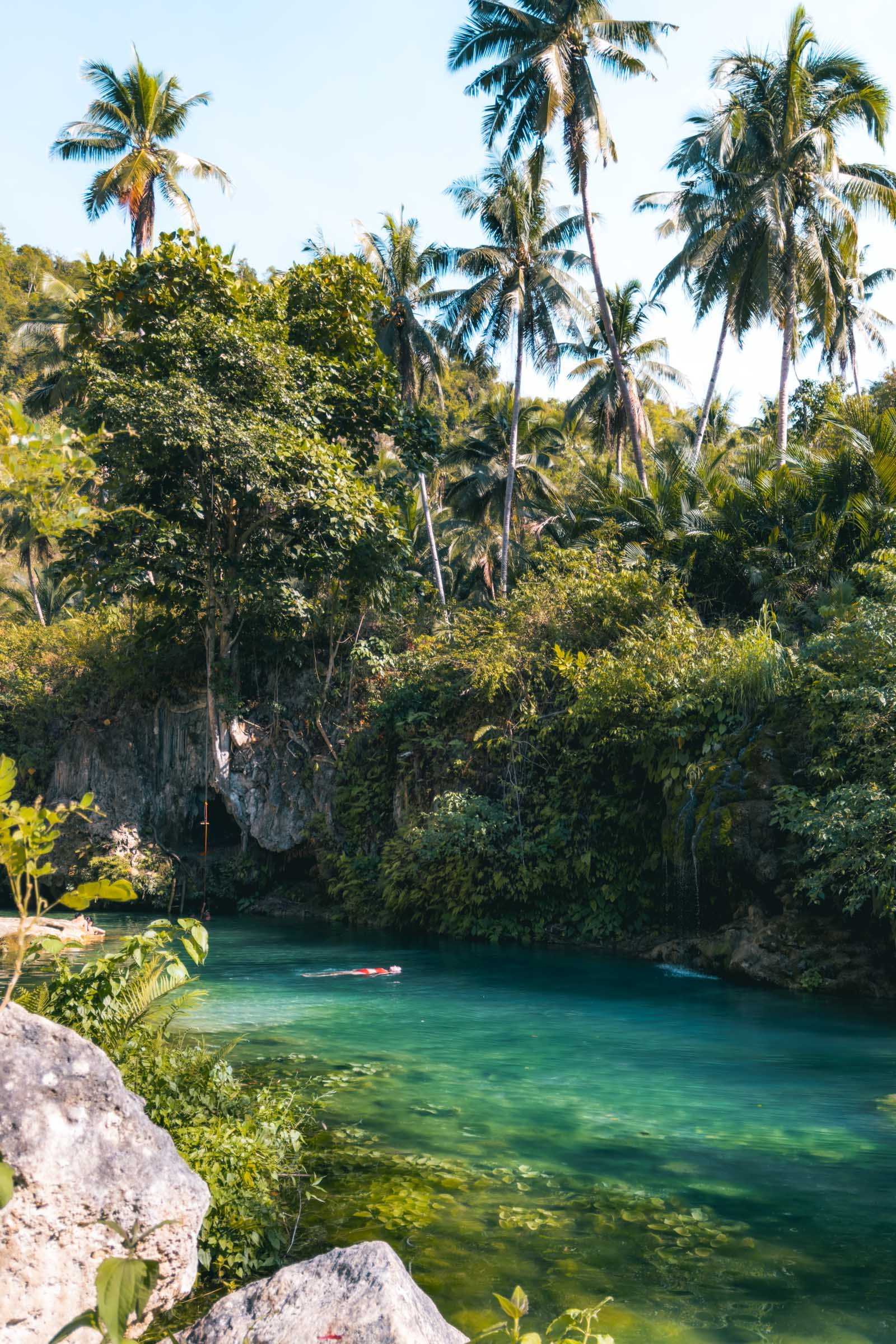
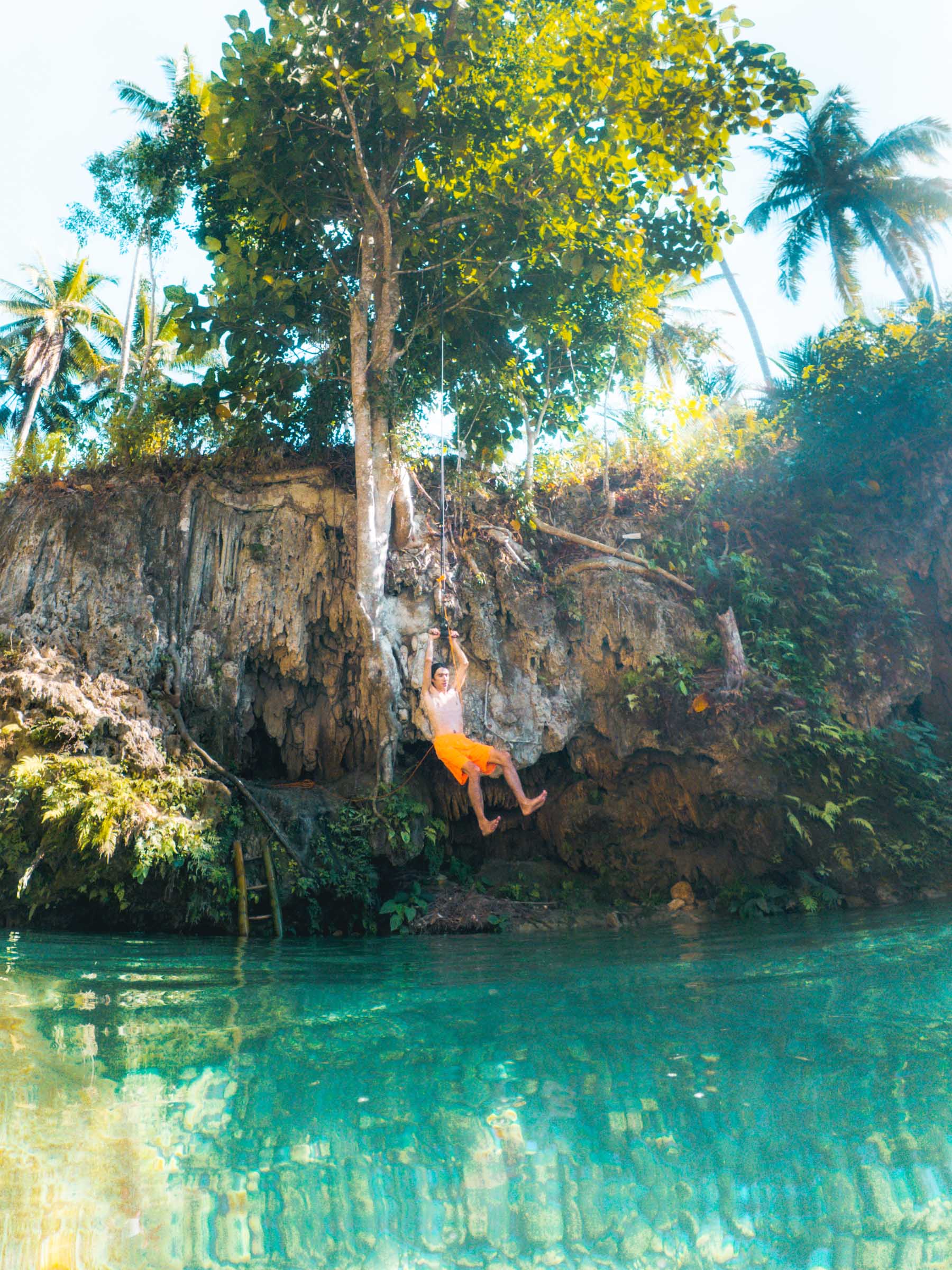
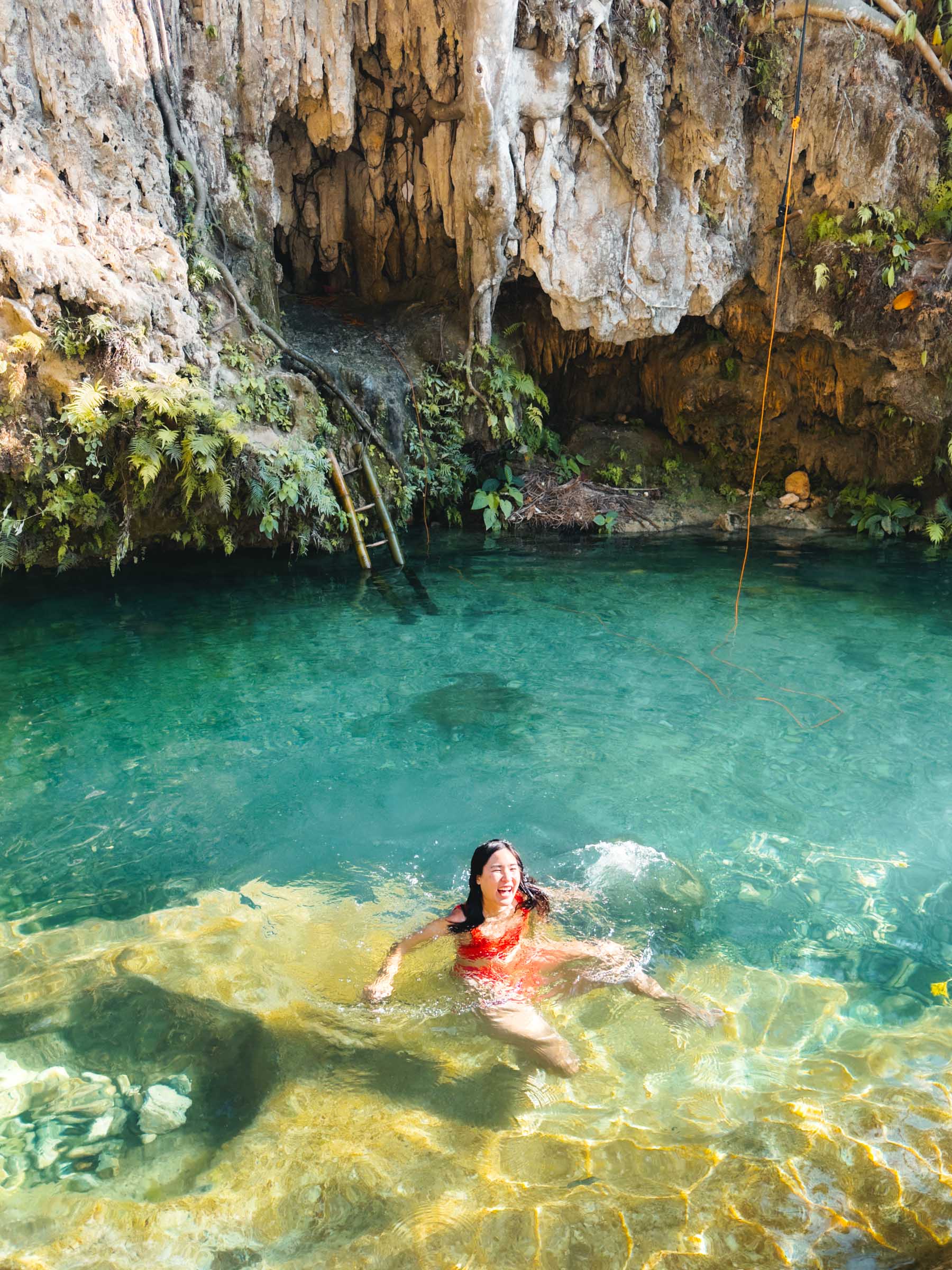
Osmeña Peak
Osmeña Peak is the highest point in Cebu. Being the highest point, you may think it’s some huge mountain, but that’s not the case. Instead, it’s part of a series of limestone hills that dot the island’s interior landscape.
The hike to the summit of Osmeña Peak is gradual and easily accessible for most people. There aren’t any steep inclines or sheer drop-offs, and you can typically reach the top in about 20 minutes.
We began our hike just as the sun was starting to set, and the trail quickly wound up the mountain, wrapping around a hill before Osmeña Peak came into view.
Once we reached the summit, we looked out over the entire western side of the island, spotting Moalboal to the north and Negros Island on the horizon to the west.
The rolling limestone hills cascaded down toward the ocean, some dotted with shrubs and others blanketed in grass.
As the sun began to set behind Negros Island, the sky transformed from bright blue to fiery shades of orange and red. The last rays of sunlight illuminated the rocky peaks with an orange hue before fading away.
Read our full blog post: Osmeña Peak in Cebu: Complete Guide
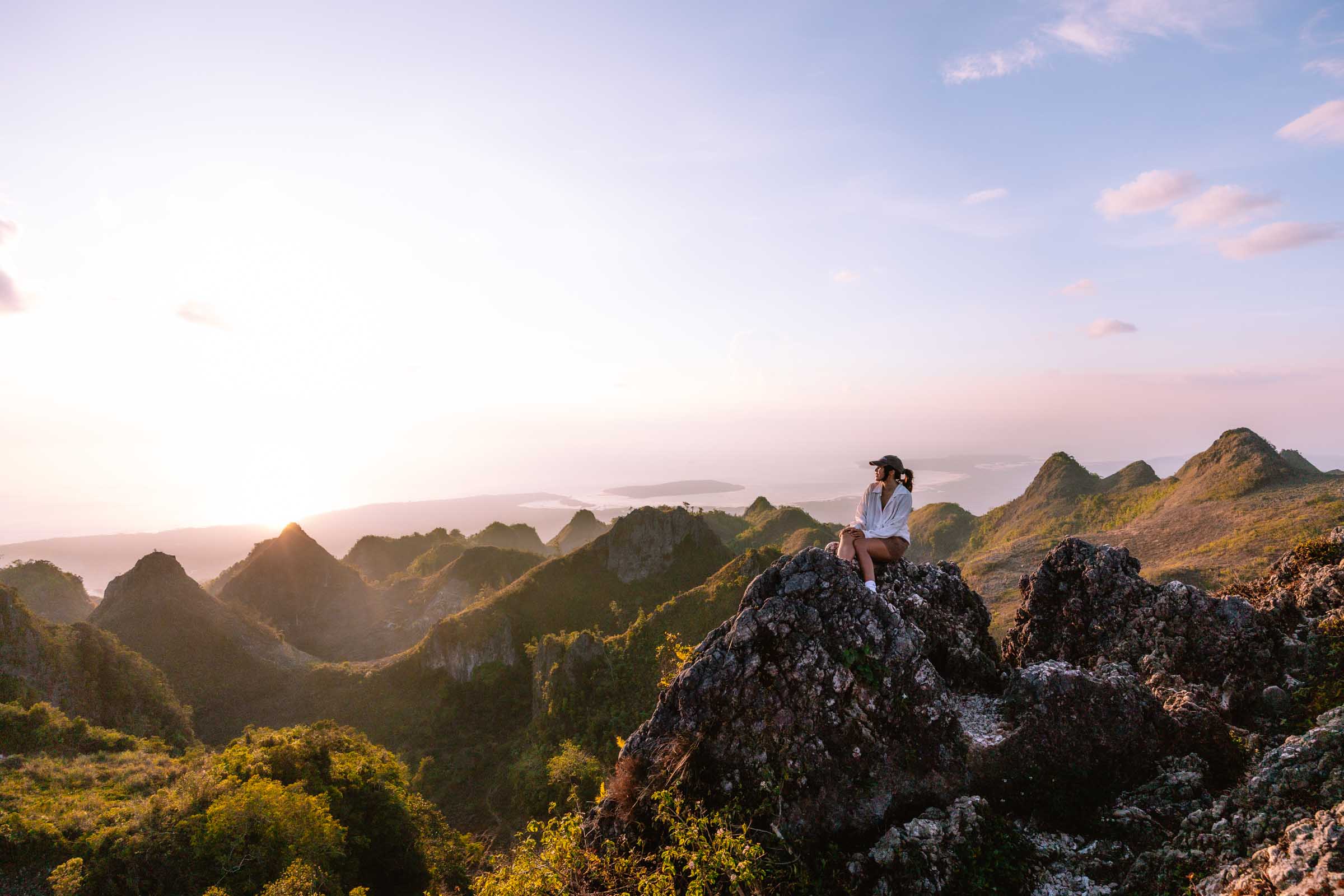


Lusno Falls
Lusno Falls is one of those spots where you get to see a different side of the Philippines.
It’s tucked away behind a local farm, and to get there we walked along trails between farm plots, saying ‘hi’ to the pigs and cows along the way.
It’s not a place many tourists visit. In fact, when we first pulled up we were a bit confused whether we were in the right place.
Even the waterfall itself stands out.
Instead of plunging into a deep basin, Lusno cascades over a limestone rock face into a wide, shallow river. The water spreads out over smooth stone, creating a thin layer rather than the rushing streams you’ll find at most other Cebu waterfalls.
Read our full blog post: Lusno Falls in Cebu: Complete Guide
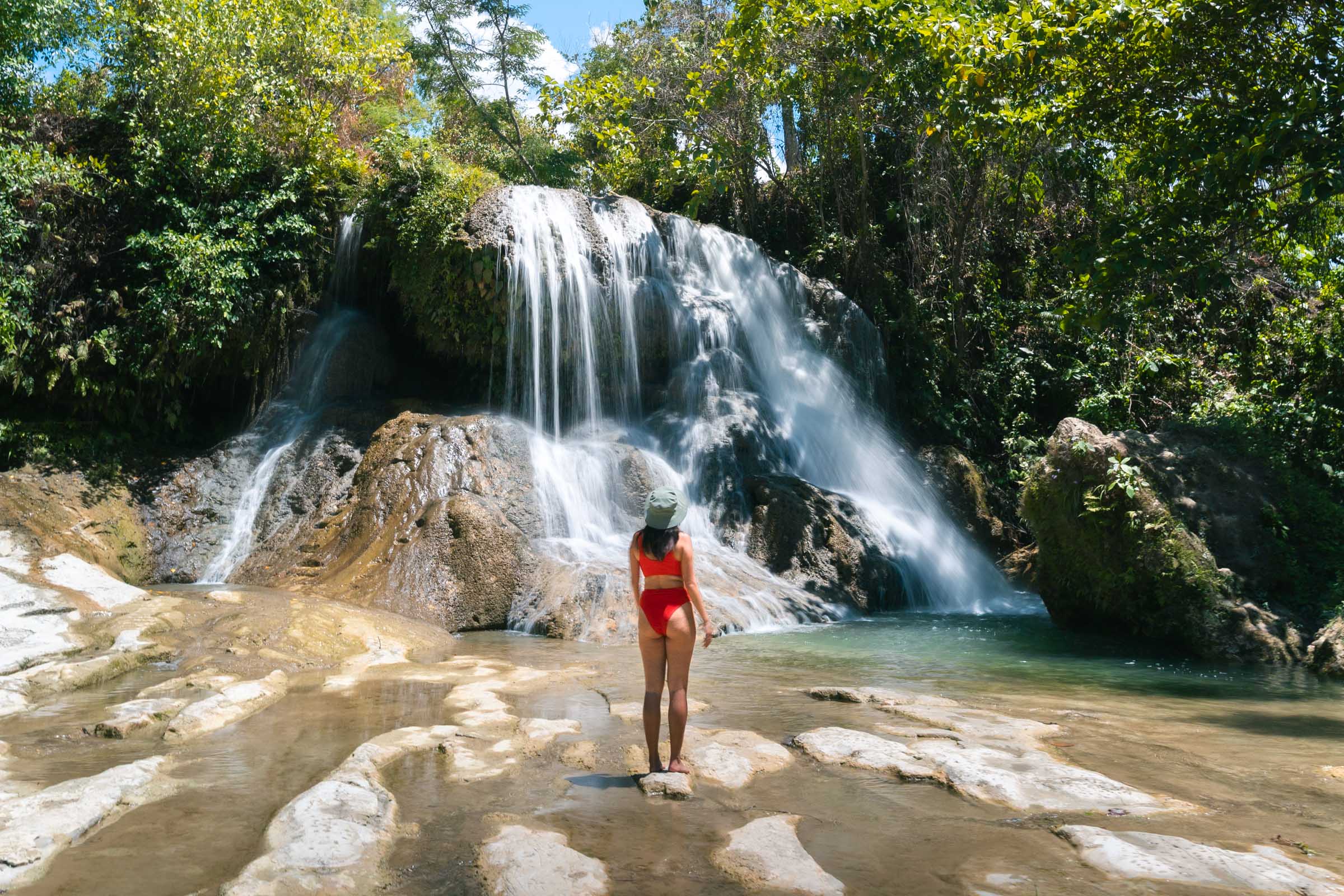
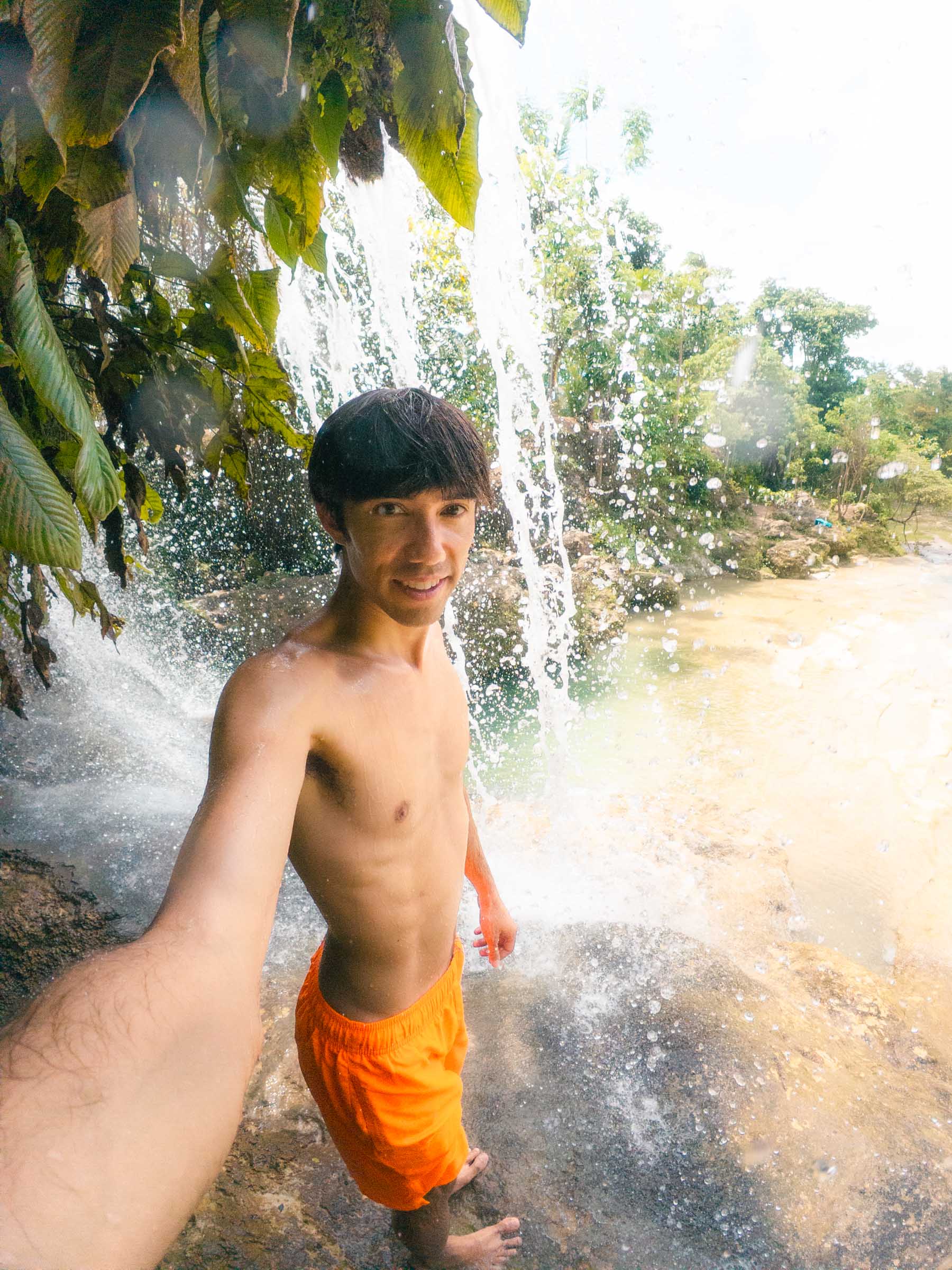
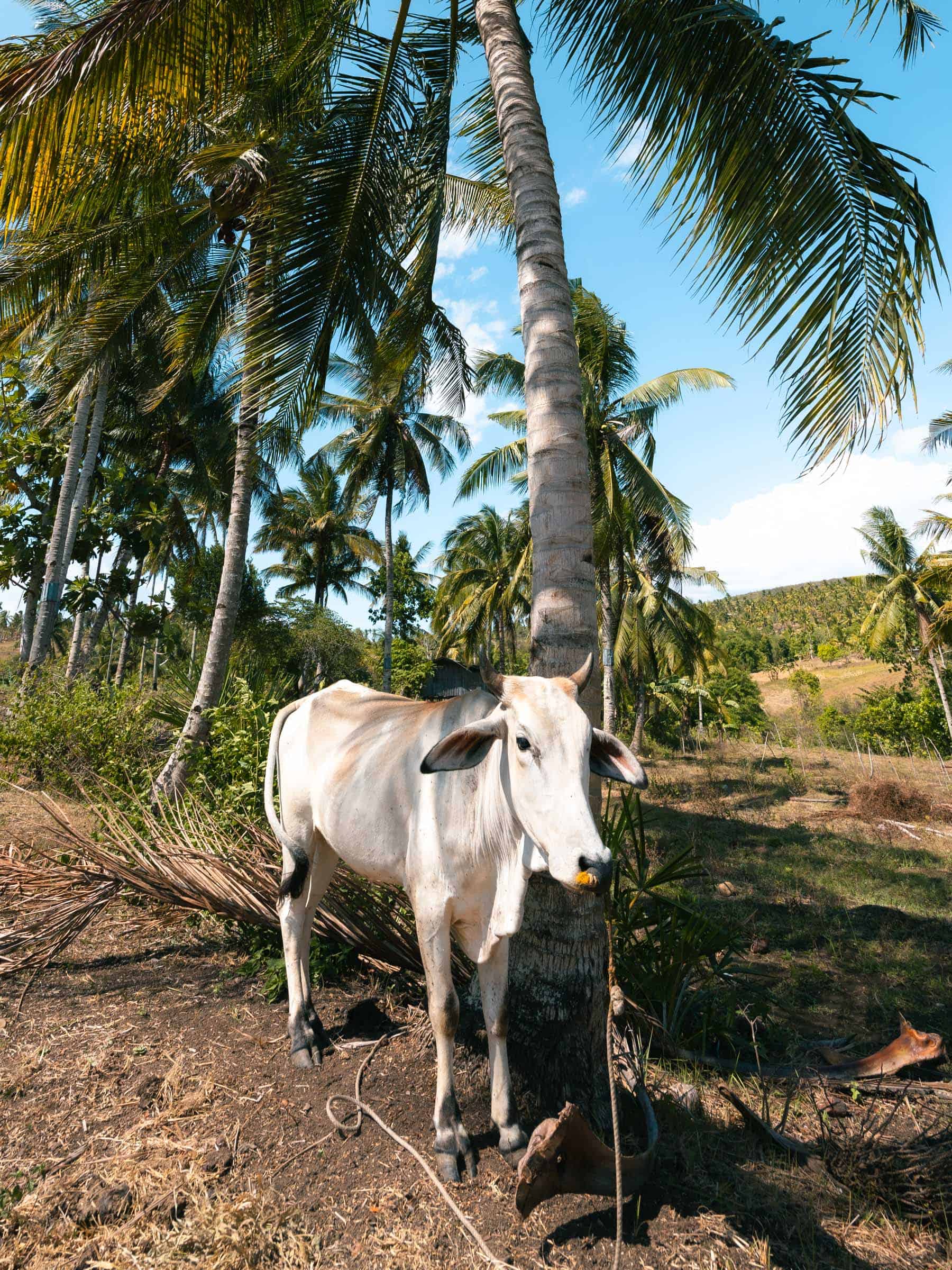
Cambanog Falls
While exploring Lusno Falls, our guide, Jar, casually asked if we had ever heard of Cambanog Falls.
Up until that moment, I hadn’t. But I was instantly intrigued.
He mentioned it was just a short walk away, downstream of the river through the farmland, and he could take us there.
With no set plans, we decided to go for it.
When we got there, we were the only tourists around. The only other people there were farmers watching over their carabaos as they stood in the river. It was a true glimpse into Filipino farm life.
What makes Cambanog Falls special is its unique, multi-tiered structure. Instead of a towering single drop, the waterfall sprawls wide across the river, cascading down flat, layered rock formations that look like natural steps.
It’s a lot more horizontal than vertical, and the water gently flows over these limestone ledges, creating smooth, wide rock surfaces. It’s very unique and I’ve never seen another waterfall like it.
Read our full blog post: Cambanog Falls in Cebu: Complete Guide
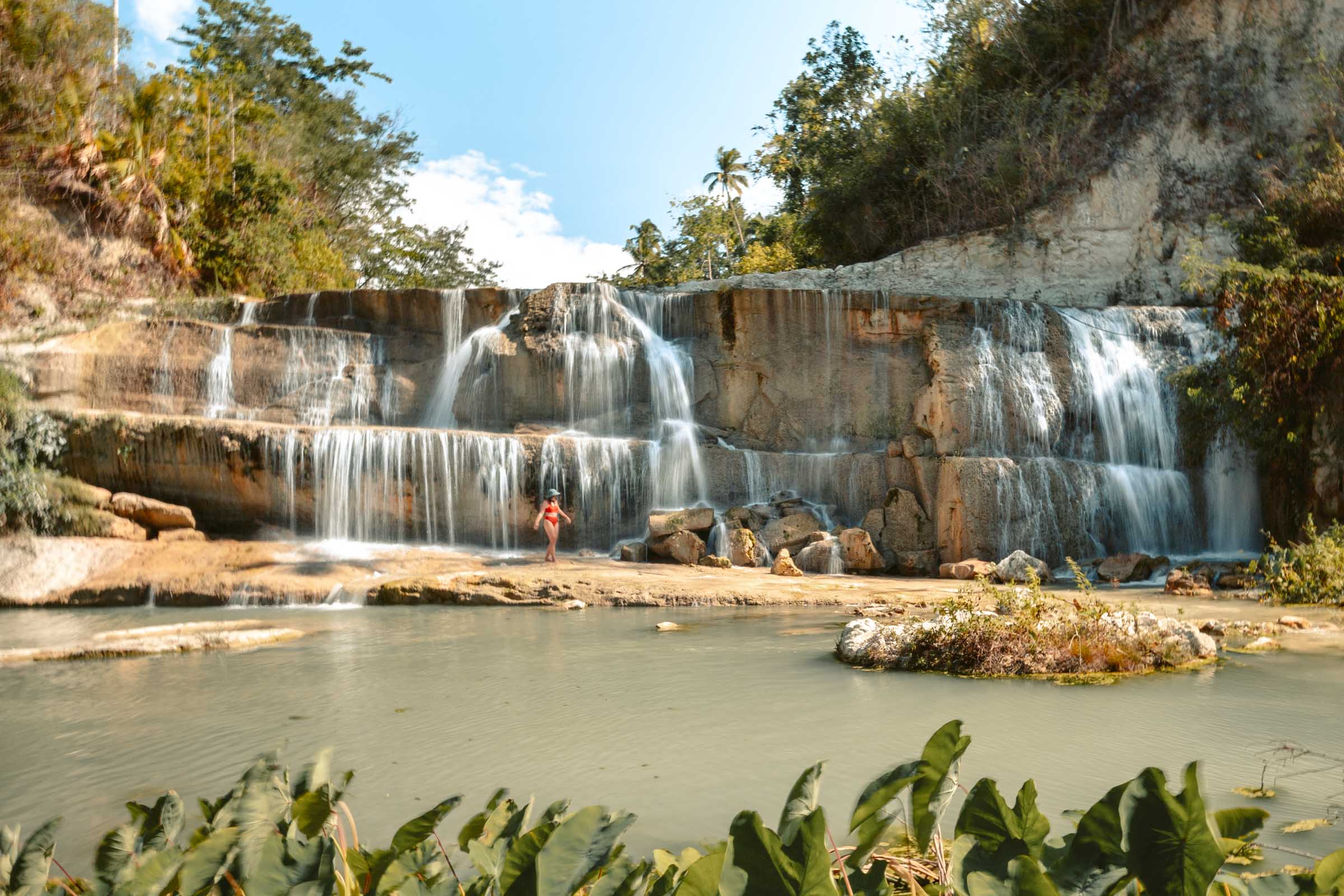
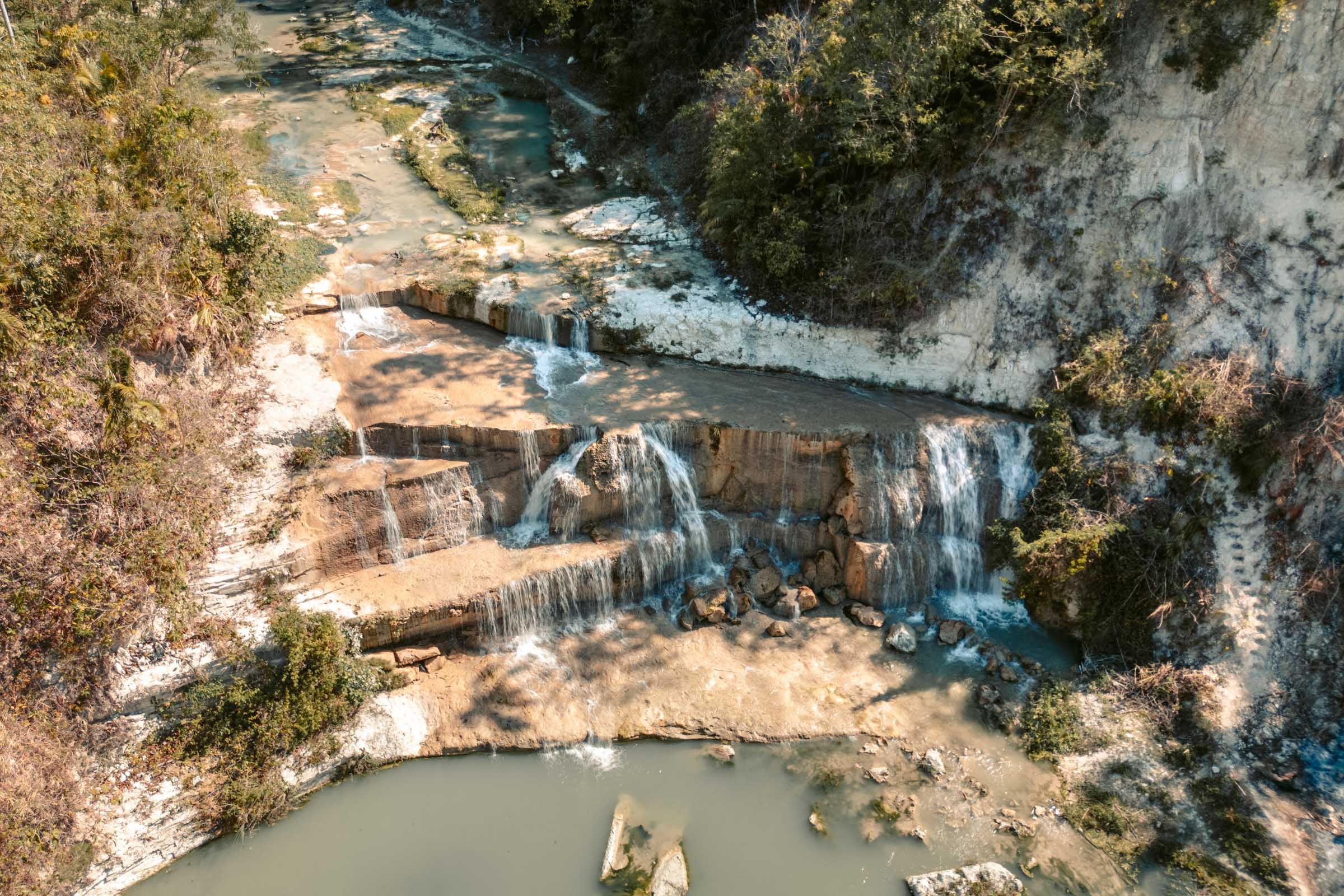
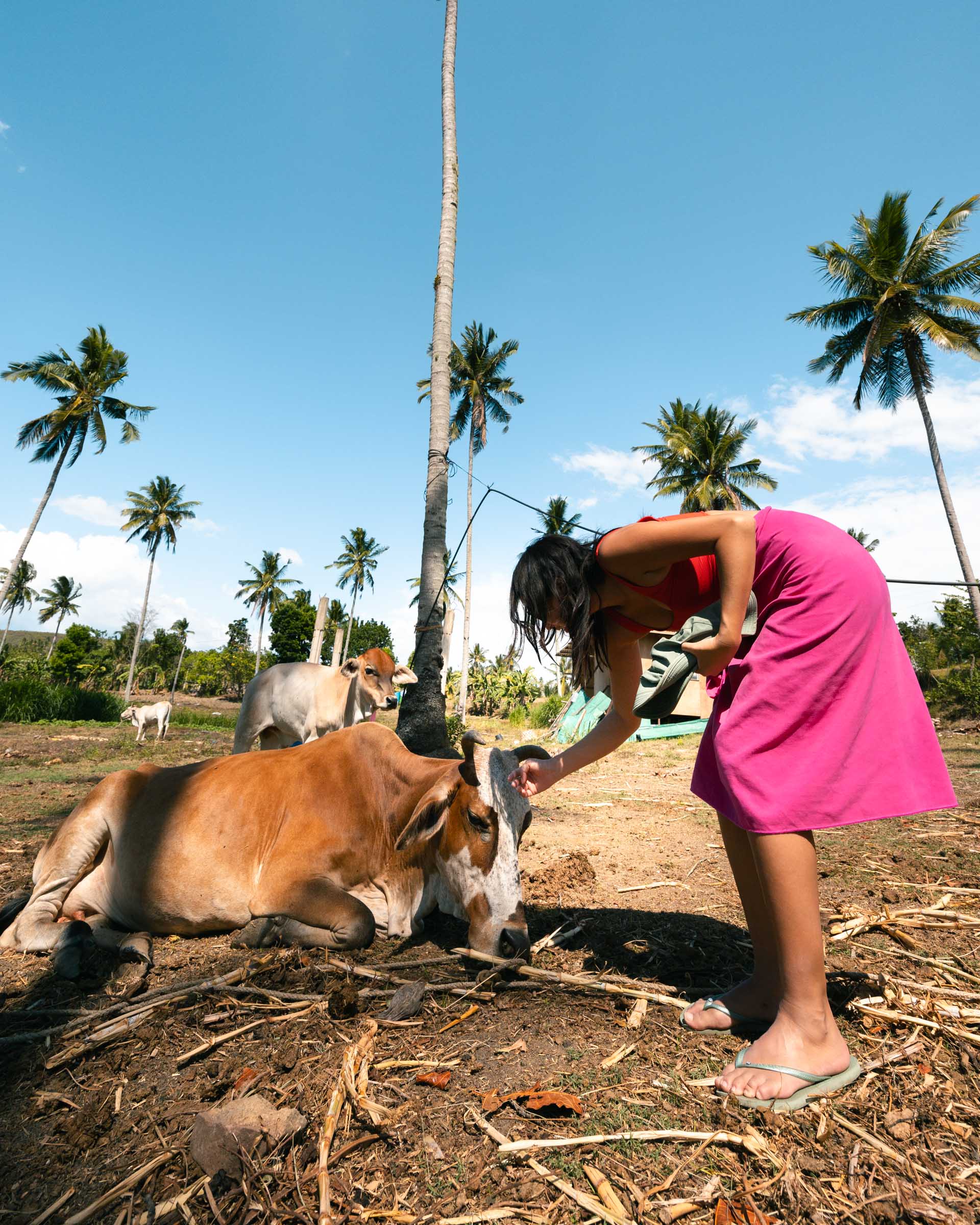
Dao Falls
Dao Falls is one of the tallest waterfalls in Cebu, and it certainly feels that way. While standing at its base, you’ll feel its towering presence as it soars into the sky.
But what truly sets Dao Falls apart isn’t just its height, it’s the adventure you go on to get there.
The hike to Dao Falls winds through a narrow limestone gorge. The trail follows a river, over slippery boulders, and along a carved-out staircase hugging the cliffside. It’s a scenic and somewhat challenging hike where the journey is just as memorable as the destination.
It really captures the essence of Cebu’s landscapes and is a place where you can experience multiple aspects of the island’s geography come together.
Read our full blog post: Dao Falls in Cebu: Complete Guide
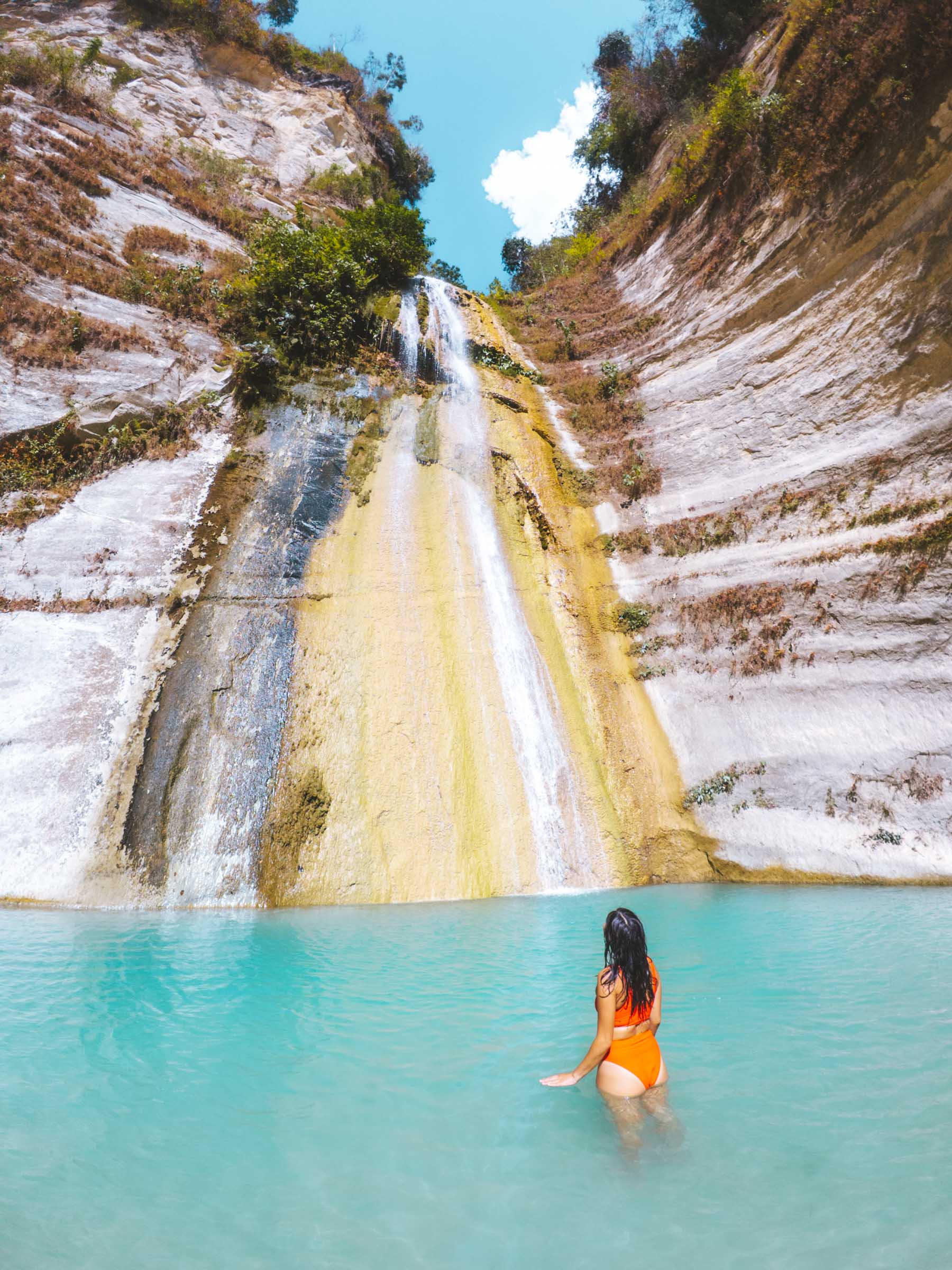
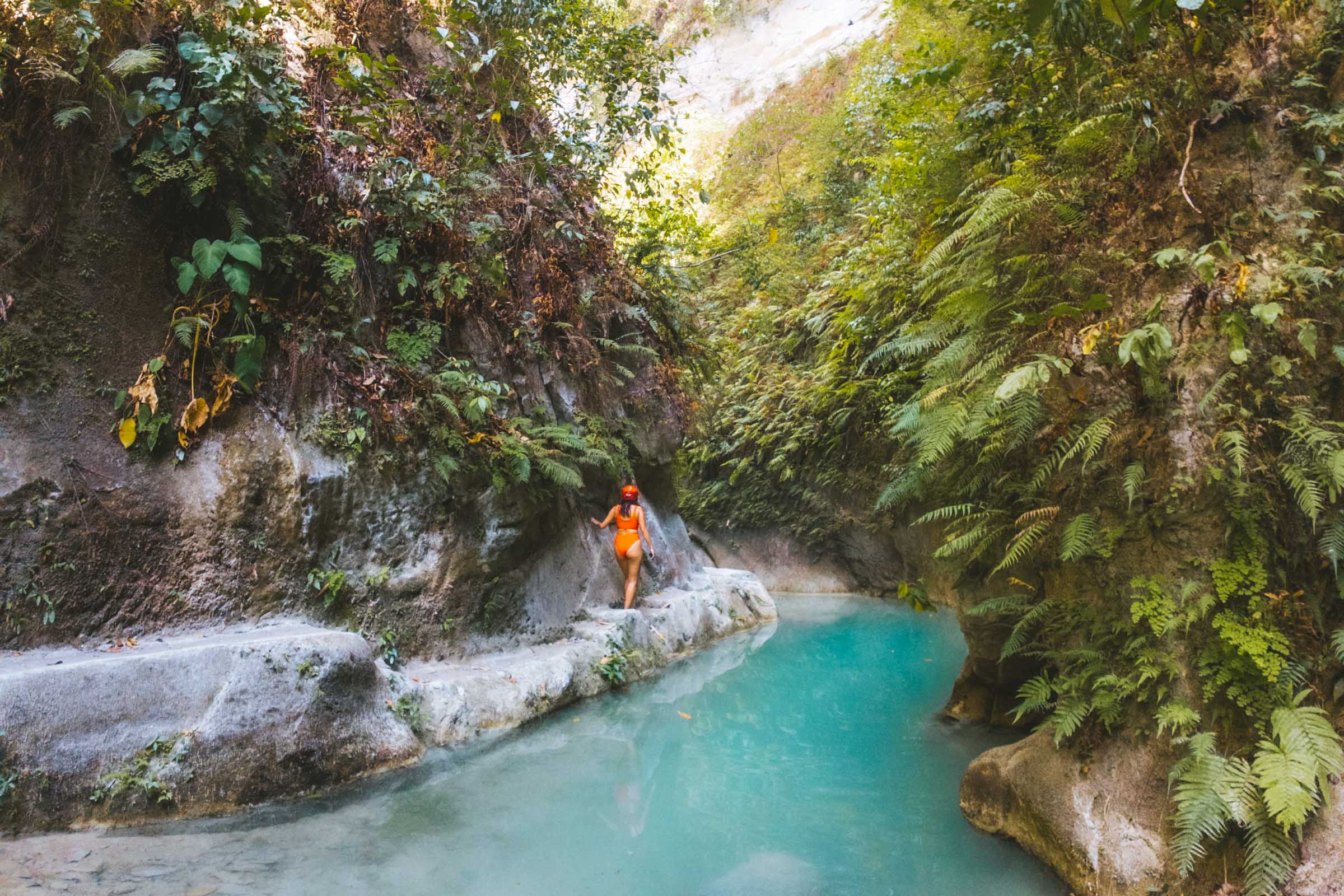
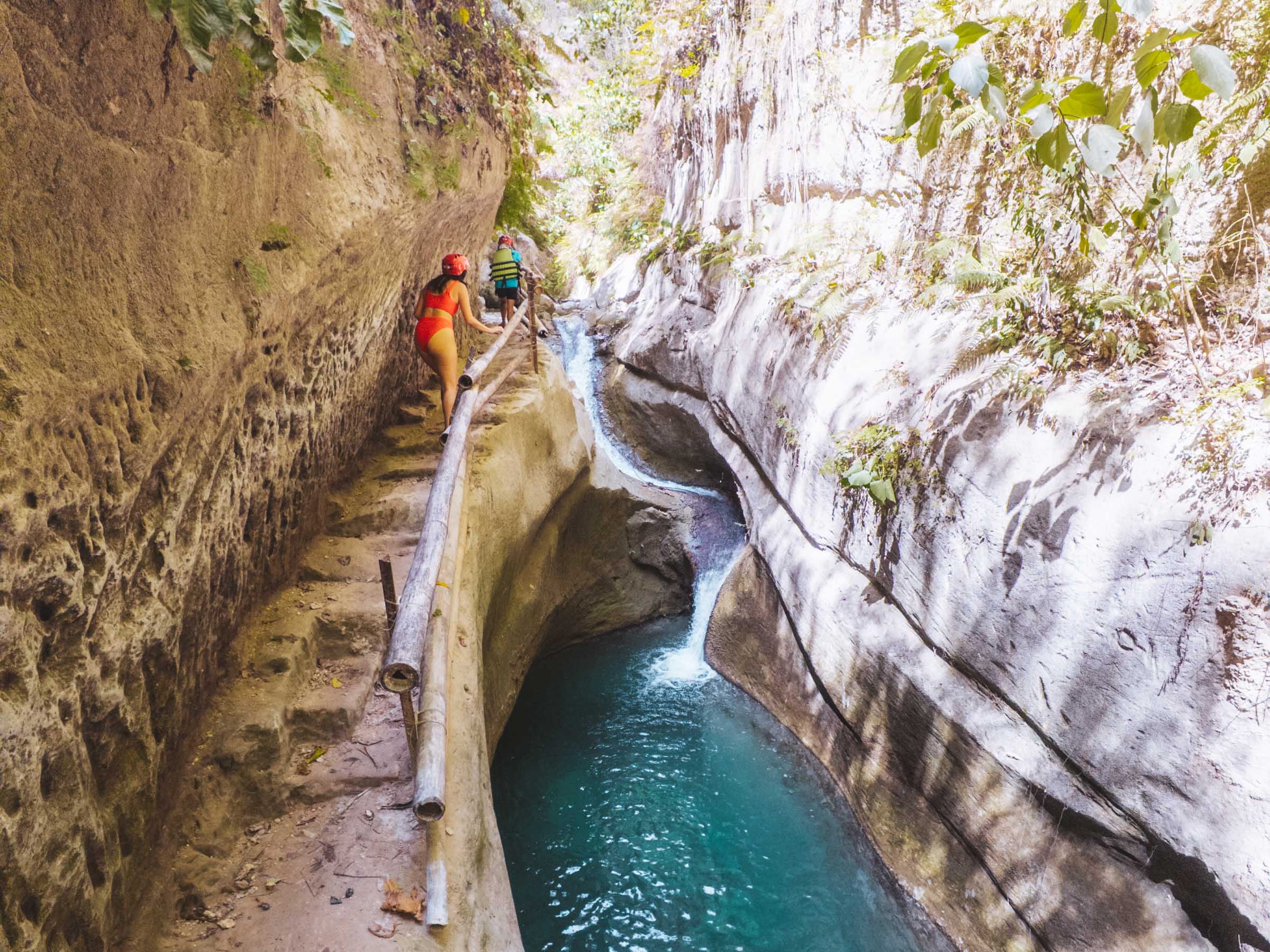
Cuartel Ruins Oslob
Most people visit Oslob for its famous whale shark watching, but many overlook what the town itself has to offer. Oslob is a cute little town with a few spots worth checking out. One of those is the Cuartel Ruins, a Spanish-era structure located right along the coastline.
Besides being a major landmark in Oslob, the area surrounding the Cuartel Ruins also serves as a town square, where locals unwind at the waterfront park, enjoy the sea breeze, and watch outdoor movie screenings on the weekends.
There are no gates or fees, so you can enter the ruins at any time to explore. You can walk through and touch the ruins, and even spot fossilized imprints within the structure. The Cuartel Ruins are also a popular spot for taking photographs, as it’s become somewhat of a symbol of Oslob.
Read our full blog post: Cuartel Ruins in Oslob: Complete Guide
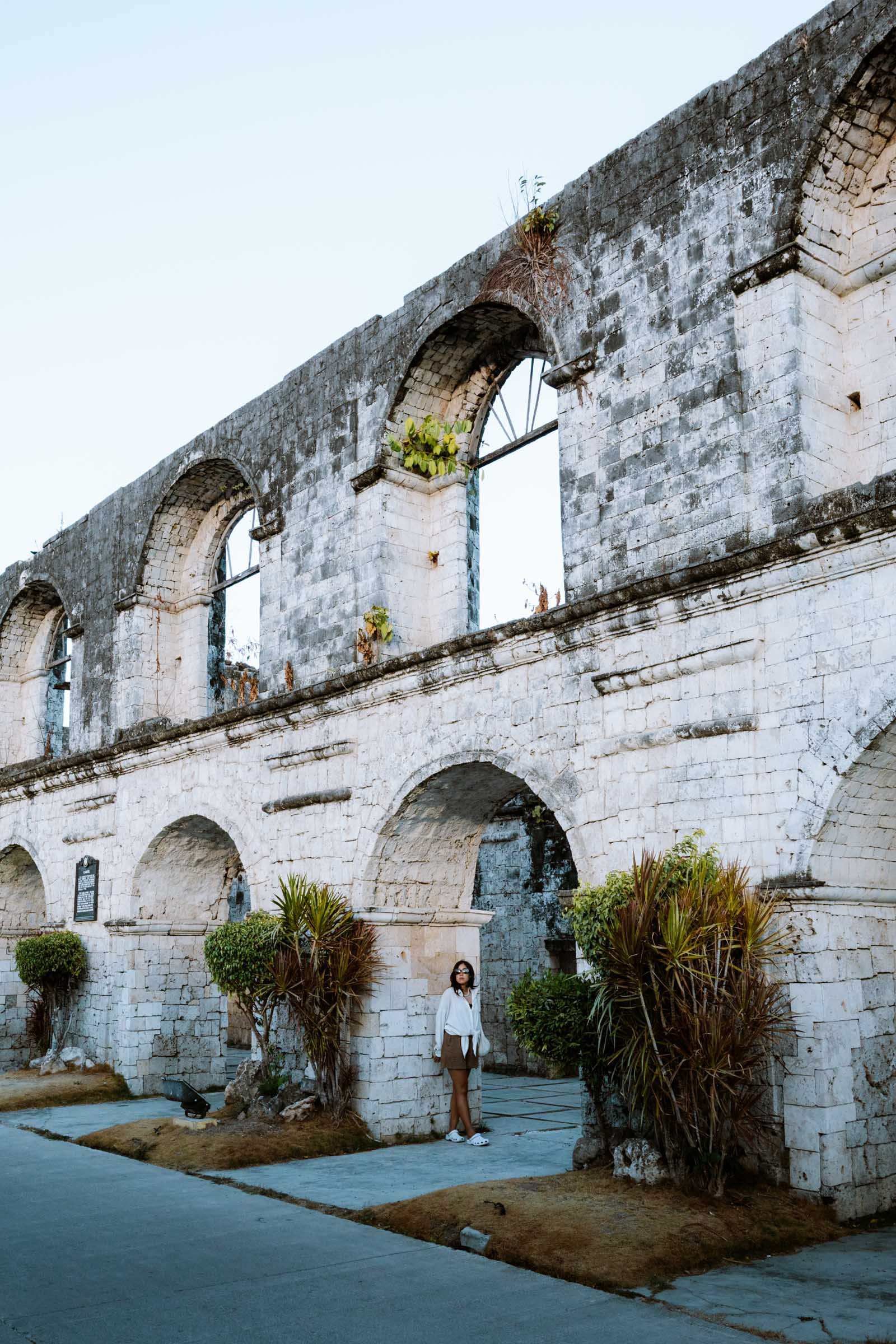
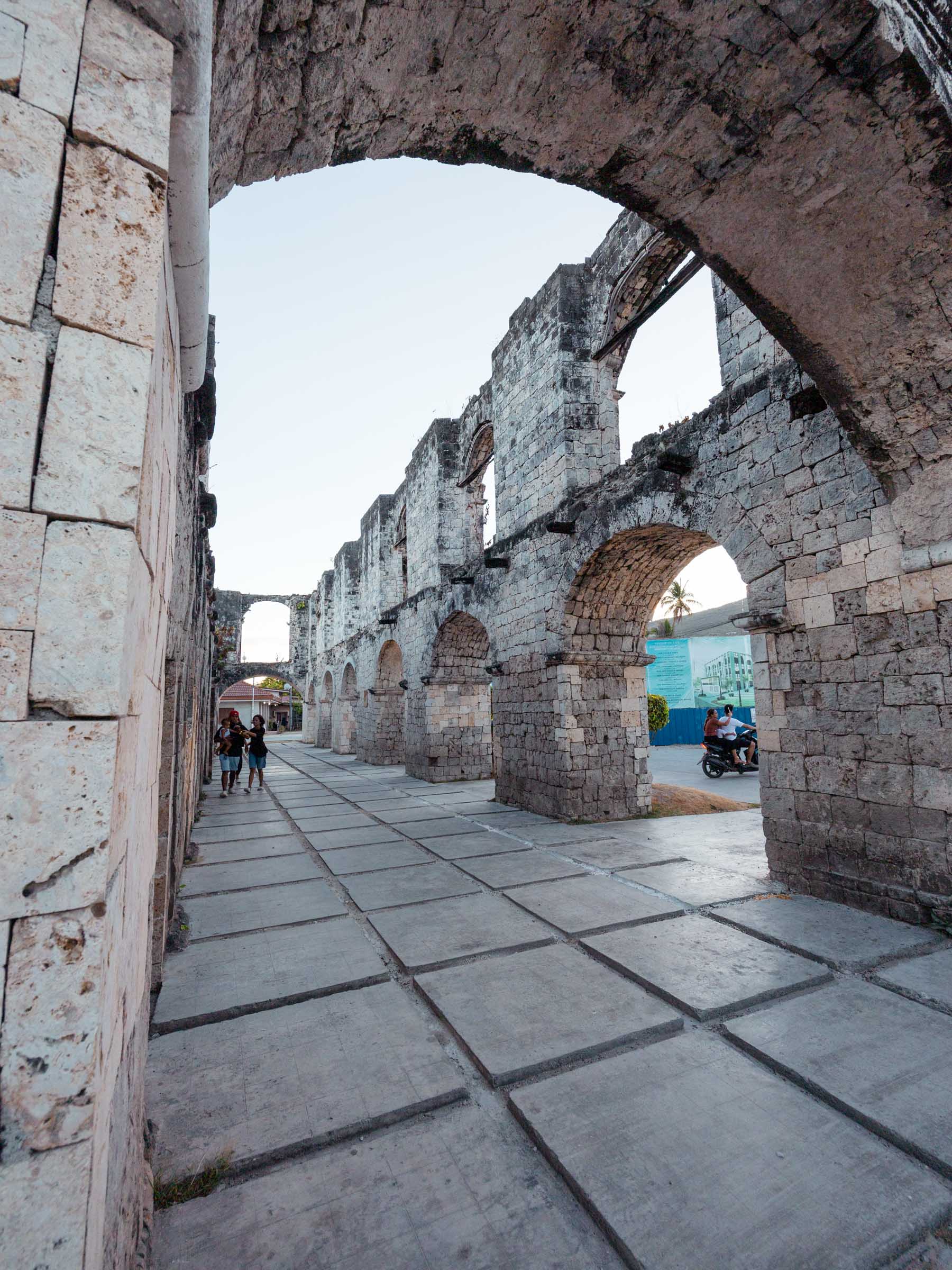
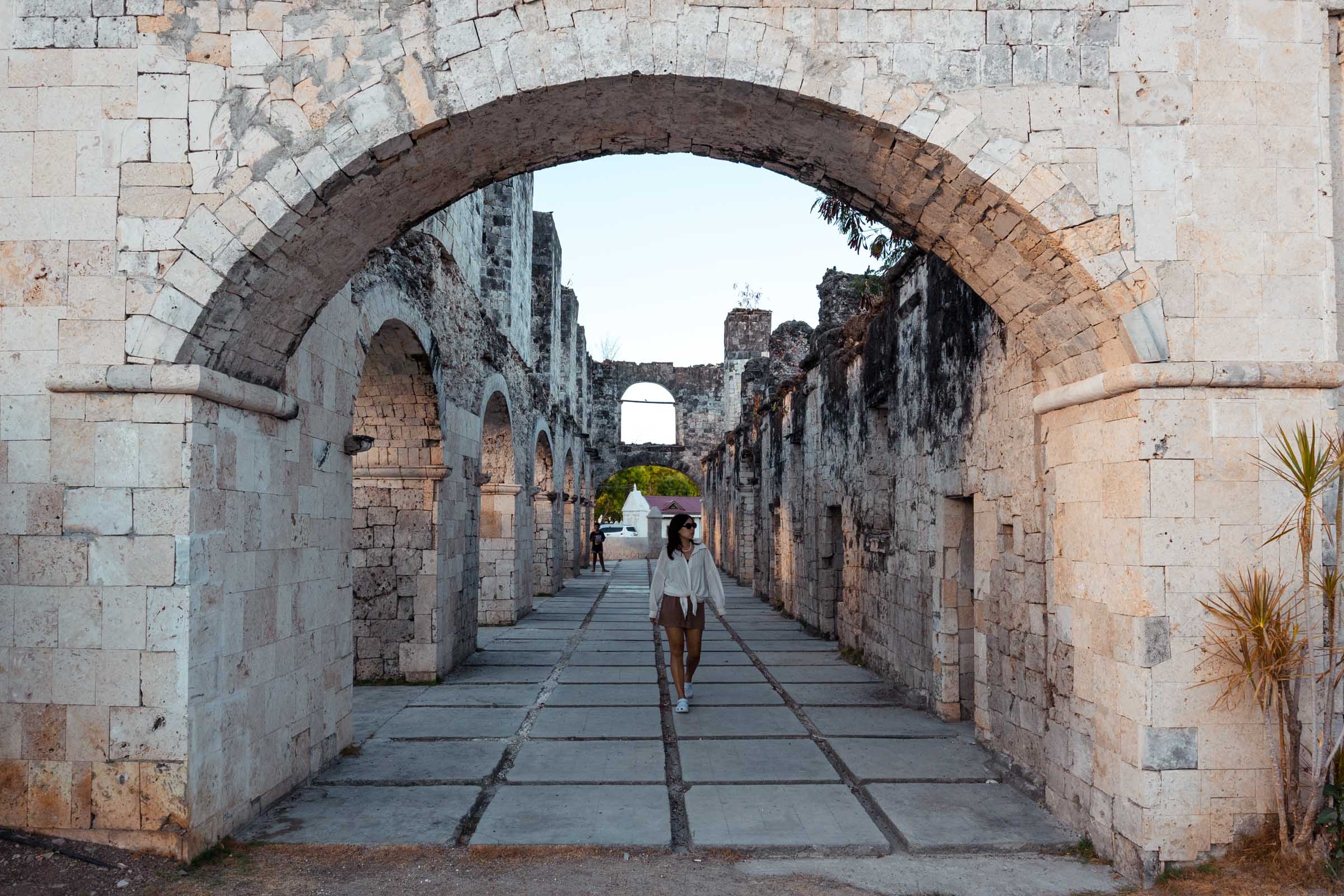
White Beach Moalboal
White Beach is a wide strip of powdery white sand. It’s a favorite for backpackers who are looking to wind down after a day of exploring by chilling out on the beach and having a few beers while watching the sunset.
The beach isn’t known for being the best for swimming, as there is rocky coral in most parts of the water. but on the tip of the beach there is a small sandy cove where you can walk out and chill in the ocean.
While you’re visiting white beach, you may get approached by hawkers selling anything from jewelry to balut. if you haven’t had either, i encourage you to try them but don’t feel pressured to buy anything.
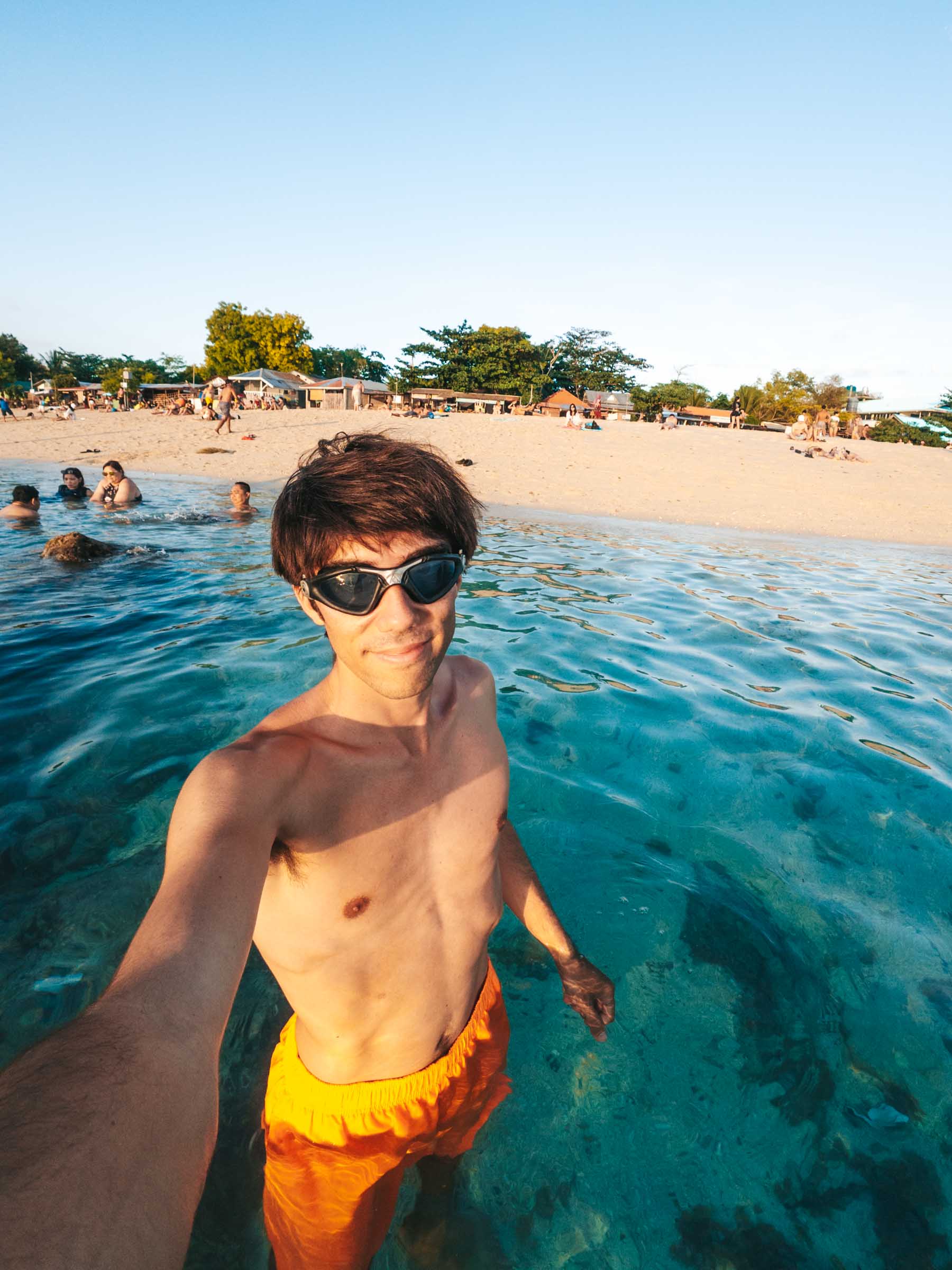
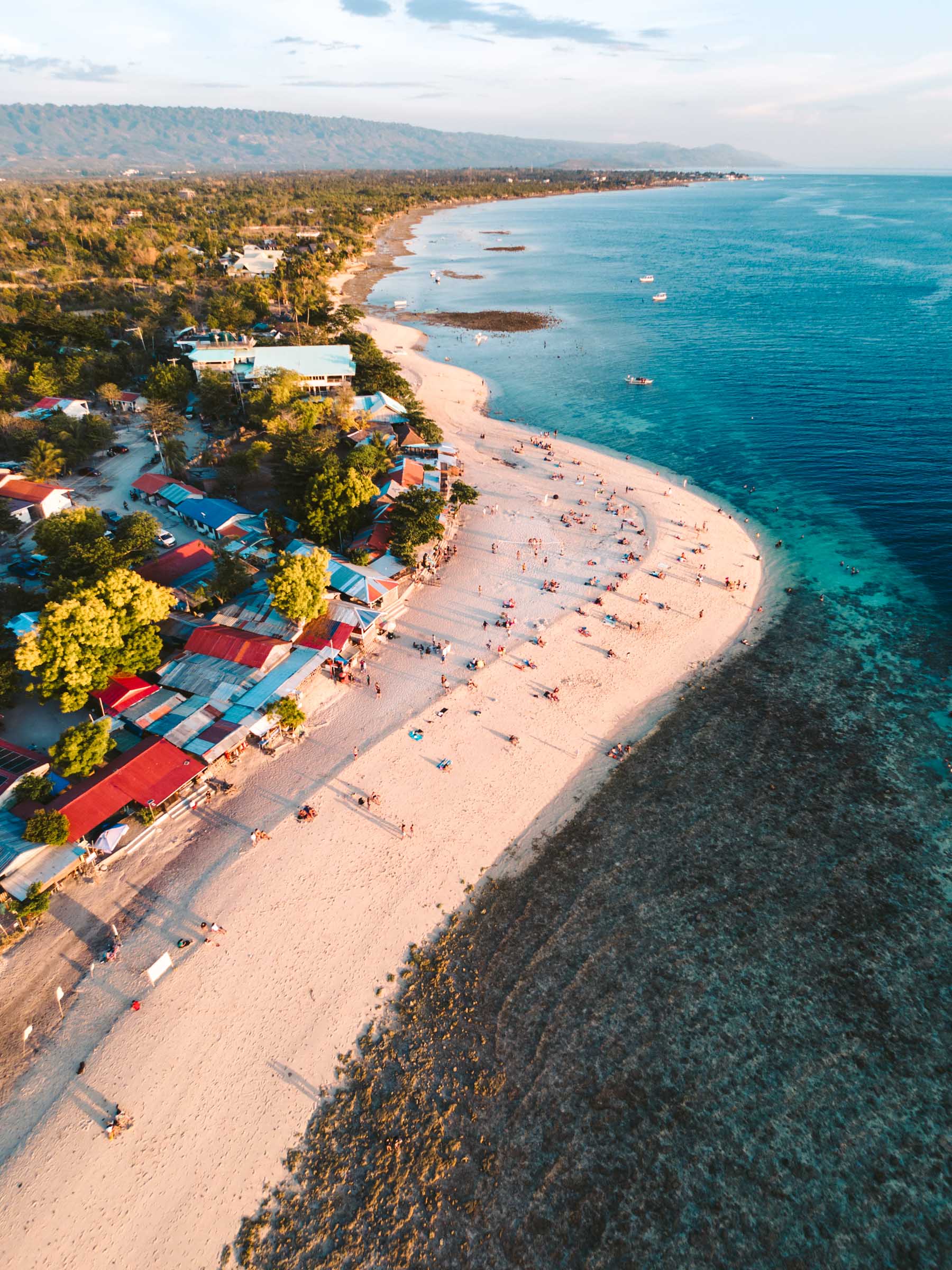
Where to Stay in Cebu
For most travelers, Moalboal is the best place to stay. It’s close to the Sardine Run, White Beach, and within range of Kawasan Falls Canyoneering.
Moalboal has a good mix of resorts, hostels, and food spots, making it a solid base for exploring Cebu.
If you’re planning to stay longer than 5 days, I recommend doing what we did by splitting your time between Moalboal and Oslob.
Oslob gives you easier access to whale shark watching, Sumilon Island, and nearby waterfalls like Tumalog and Binalayan. This way, you cut down on travel time and get to see more.
Here’s where we stayed at and recommend in Cebu:
- Moalboal: 3 Sisters Guest House 2 is just off the main strip in Moalboal, but still within walking distance of everything. We appreciated the security and cleanliness of the accommodation and ate breakfast there every morning of our stay.
- Oslob: Melronz Inn is situated a bit outside the town center, making it quieter and more relaxed. And the best part is that it’s located right on the water, with its own private ocean access.
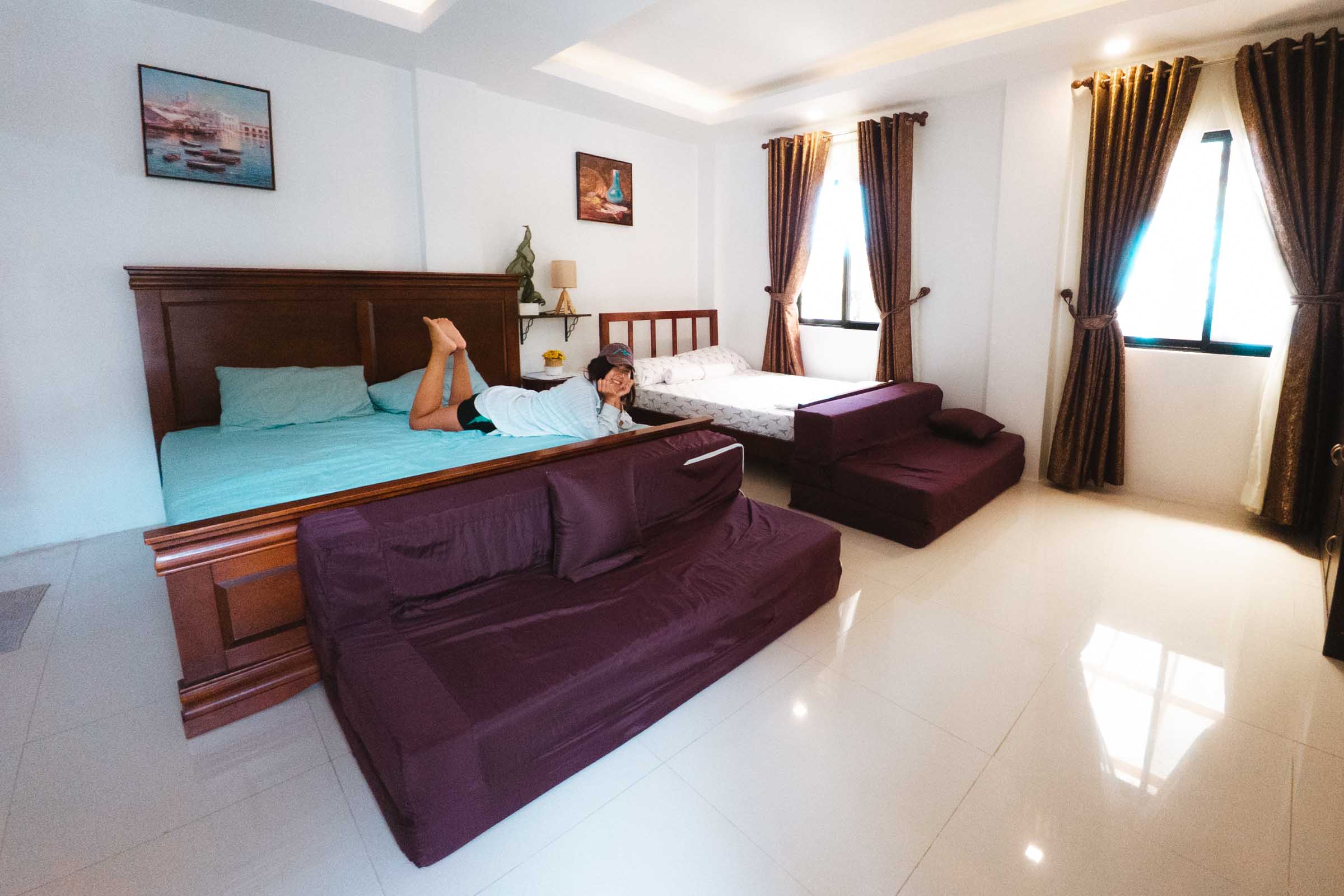
How to Get Around Cebu
Renting a motorbike is the best way to explore Cebu. You can rent a motorbike for 300 to 500 pesos per day, giving you the freedom to visit the island’s attractions at your own pace.
Alternatively, tricycles are available for hire in tourist-heavy areas such as Moalboal and Oslob, while buses operate on the main roads. If you’re looking for comfort, you can also hire a private driver for day tours.
Read our full blog post: Renting a Motorbike in the Philippines: Complete Guide
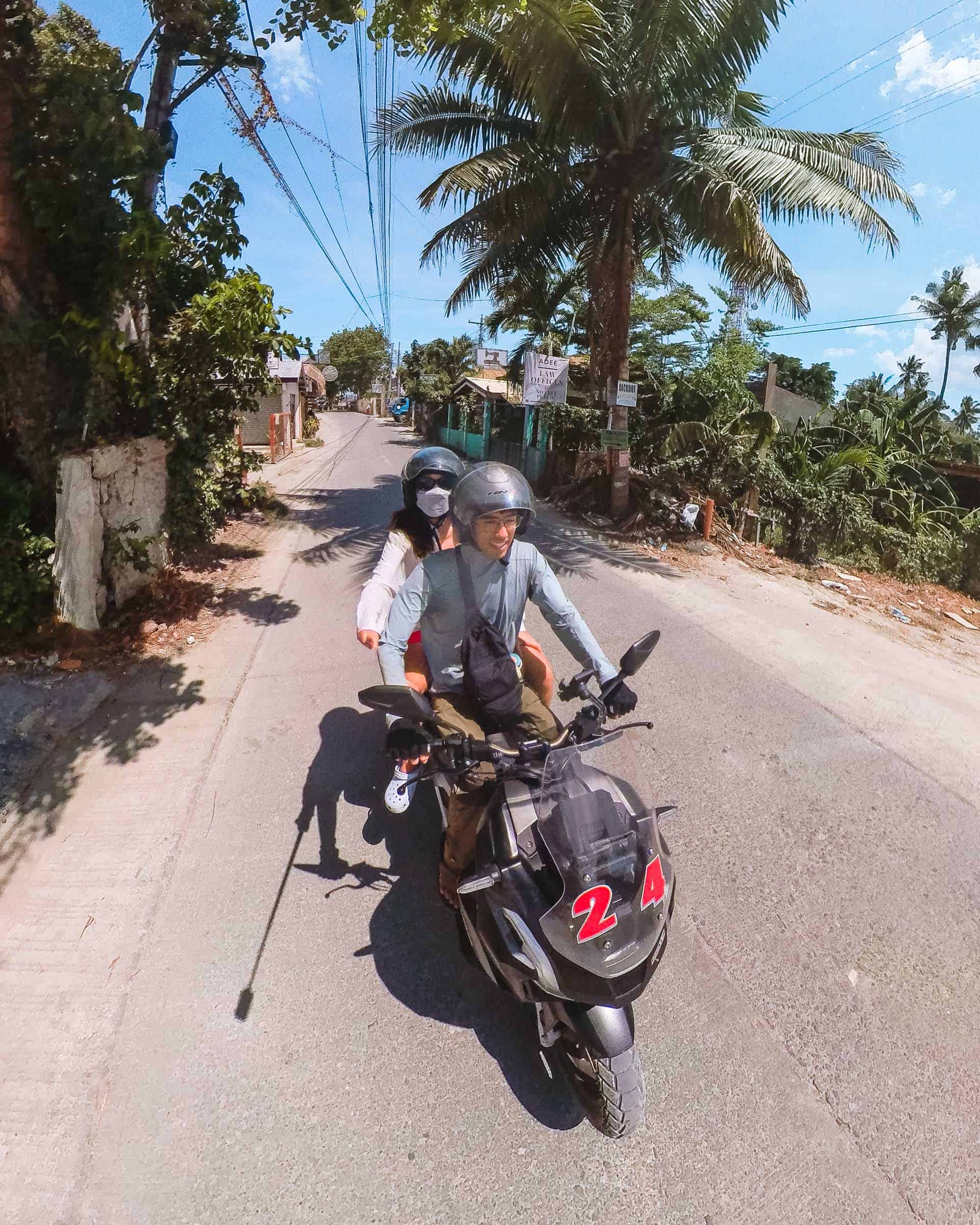
What to Pack for Cebu
- Water Shoes: If you plan to go canyoneering, a solid pair of water shoes like these are needed. If not, you can always wear crocs or even your sneakers if you don’t mind them getting wet!
- Snorkel: With sardine run in Moalboal and whale shark watching in Oslob, it helps to have your own snorkel set like this one for the best experience! Plus, you won’t need to worry about renting a snorkel, which may be of… questionable quality.
- Sunscreen: For some reason, sunscreen is expensive in the Philippines and I’ve even encountered places selling fake sunscreen that doesn’t work! So I recommend bringing your own sunscreen to Cebu.
- Dry Bag: With all the sand, salt, and water flying everywhere during our adventures, I was so glad to have a dry bag to keep all my things safe from the elements!
- Travel Towel: In my opinion, a travel towel like this one is super necessary for a trip to Cebu! It packs down nicely and was there for me anytime I went swimming, or just needed to brush sand or dirt off.
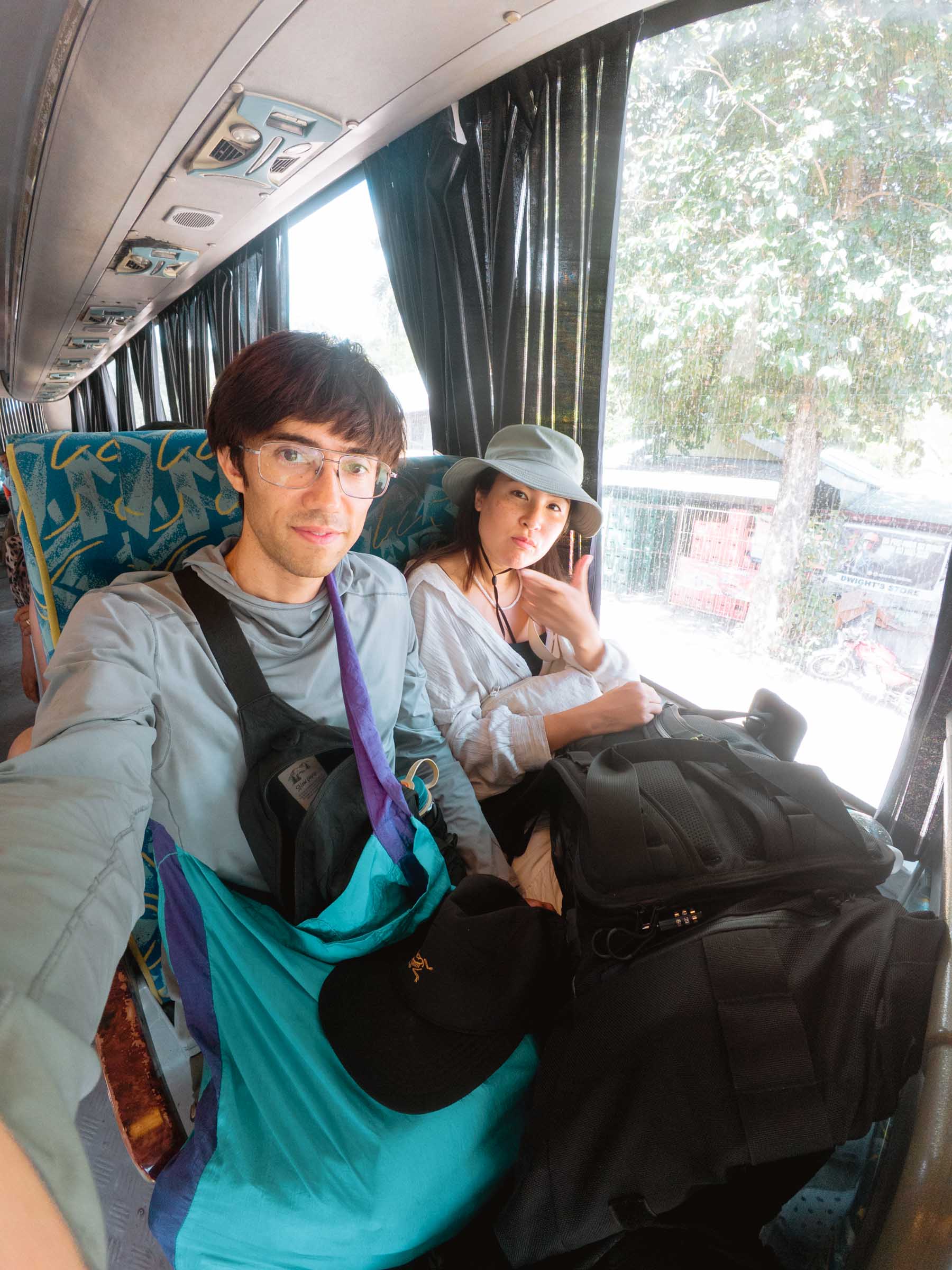
Our Free Cebu Google Maps Locations
Want a free map of all of the locations mentioned in this post? Sign up in the box below and we’ll deliver one right to your inbox, plus our top tips to help you plan your Cebu trip!
Need more Cebu travel ideas?
During our 7-day adventure in Cebu, we found some of the island’s most stunning natural wonders—milky blue waterfalls, limestone hikes, and incredible snorkeling spots. To help fellow adventurers, we’ve put together guides to the best places we found. You can check them out by clicking the links below.
- Start your planning here: Cebu Travel Guide
- Our Ultimate Guide to Cebu: 15 Incredible Things to Do in Cebu
- How to plan your Cebu vacation: Cebu 3 Day Itinerary
- Our Moalboal accommodation guide: Where to Stay in Moalboal
- Our favorite waterfall (+ secret adventure) in Cebu: Inambakan Falls
- Hike to the highest point in Cebu: Osmeña Peak
- Our favorite hike in Cebu: Casino Peak
- Our favorite day tour in Cebu: Kawasan Falls Canyoneering
- The hottest hot spring we’ve ever visited: Mainit Hot Spring
- How to see the Moalboal Sardine Run without a tour
- Oslob Whale Shark Watching Complete Guide
- How to get from Cebu City to Moalboal
- How to get from Moalboal to Oslob
- How to rent a motorbike in the Philippines
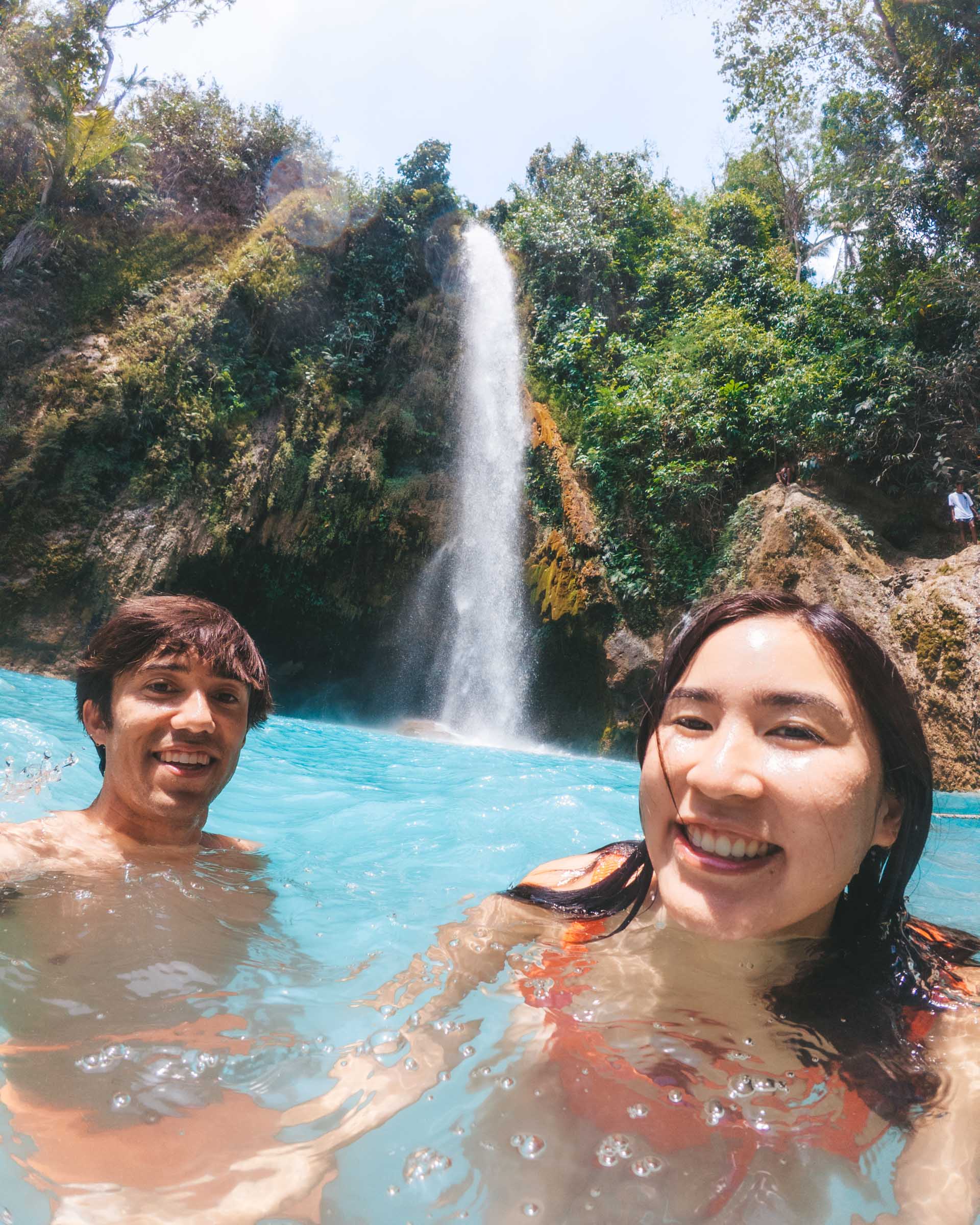
We hope our guide to things to do in Cebu helped you out in planning your adventure! Feel free to leave a comment below if you have any questions 🐸

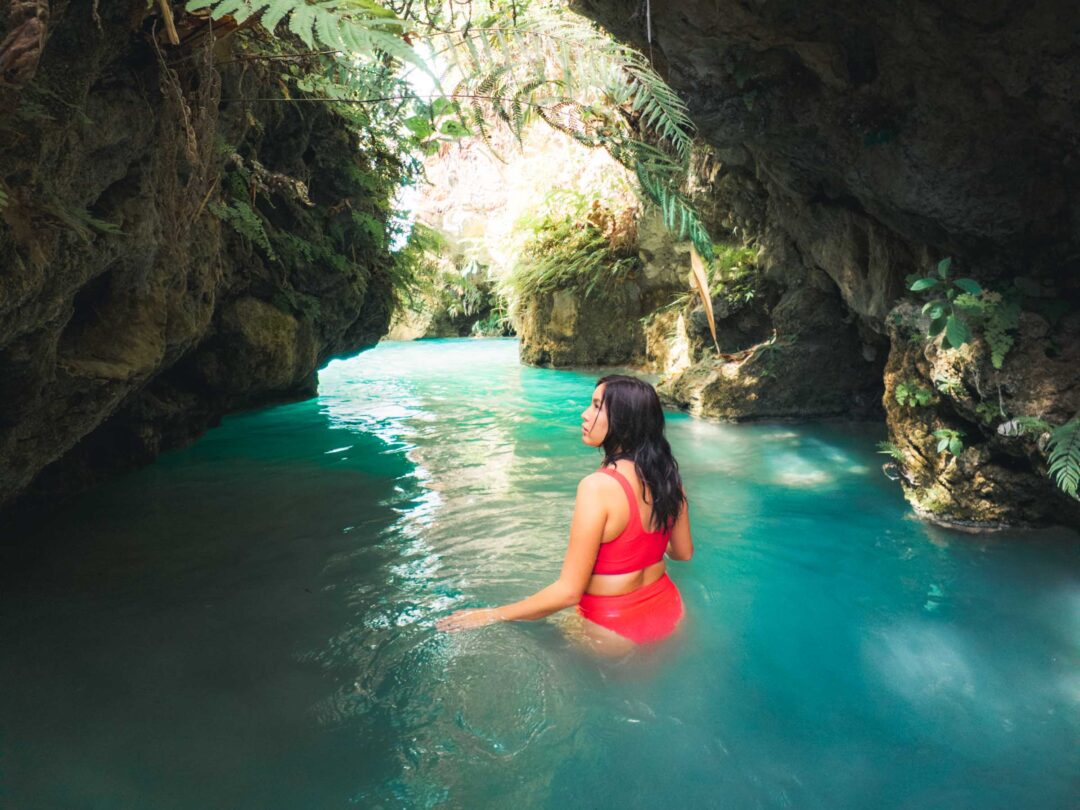
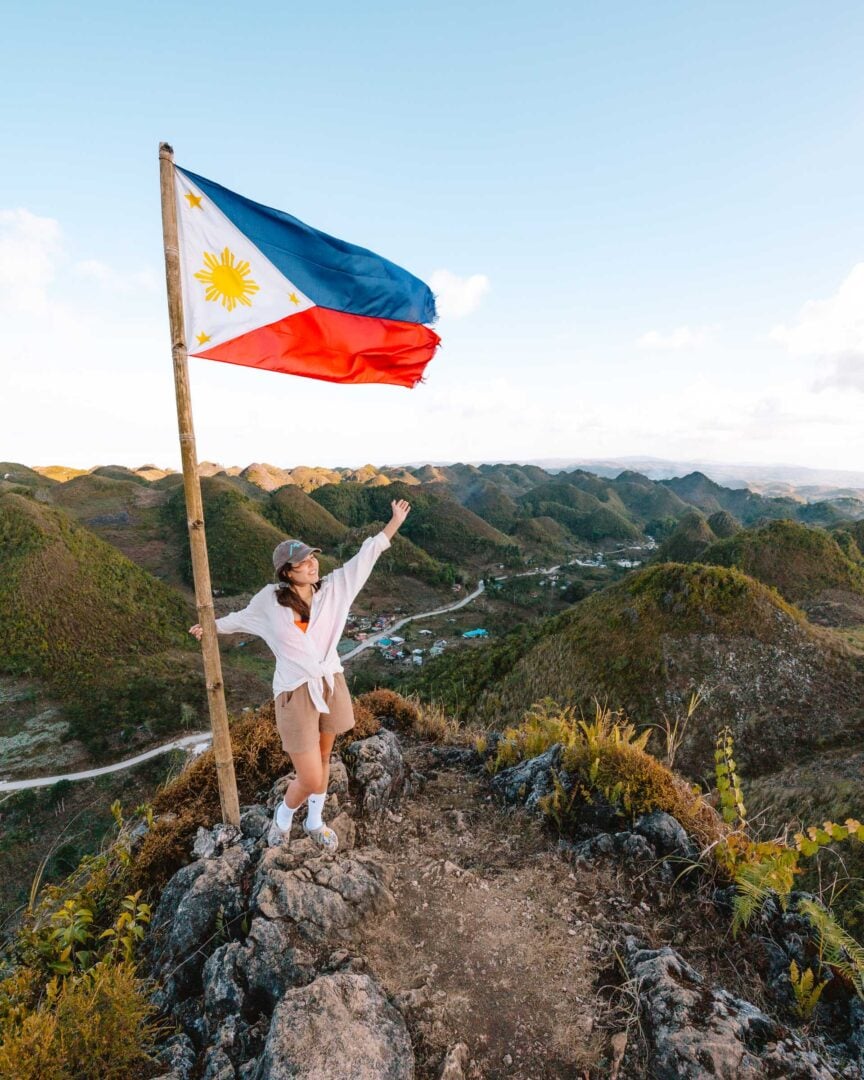
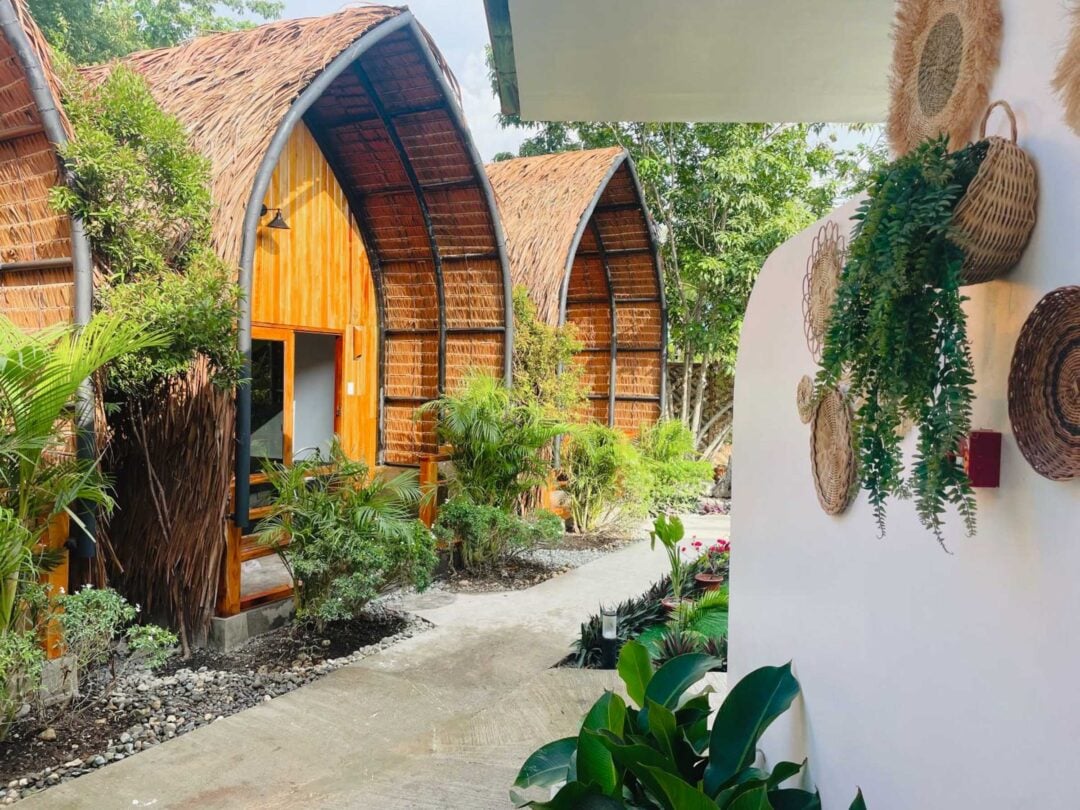

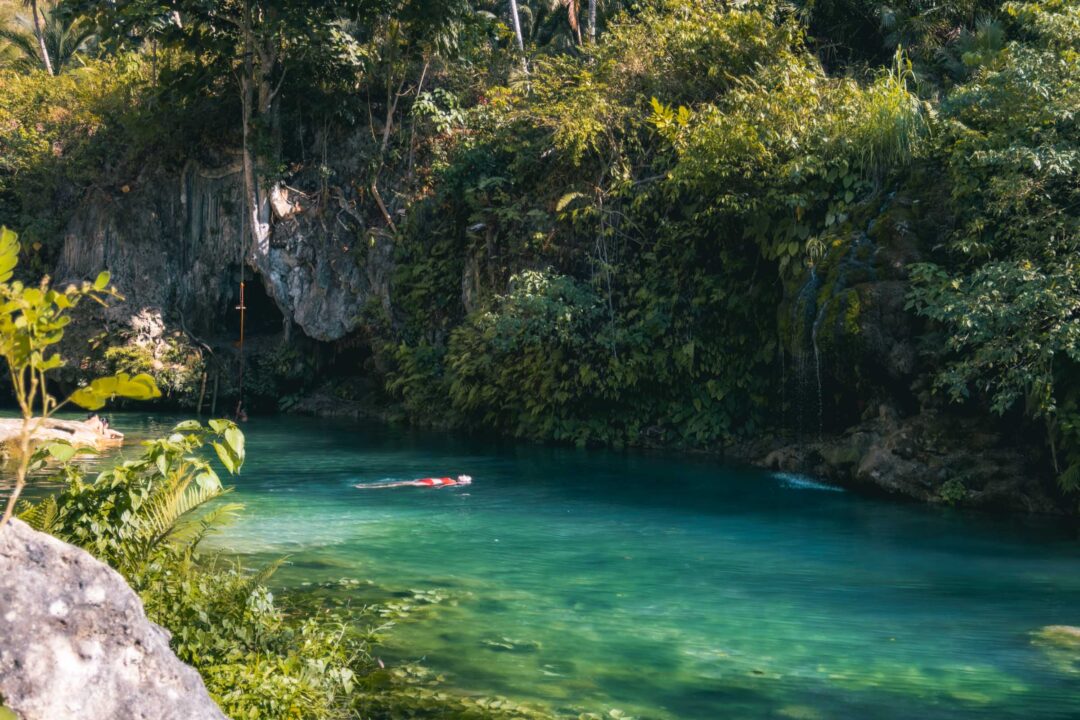
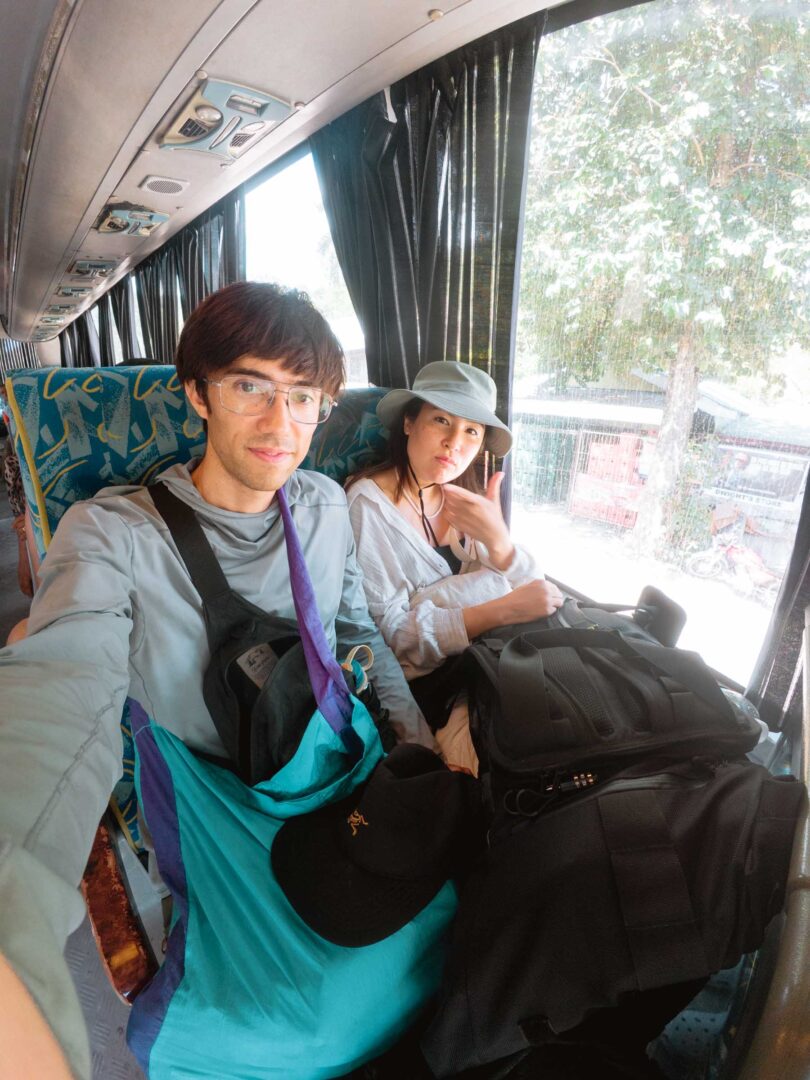
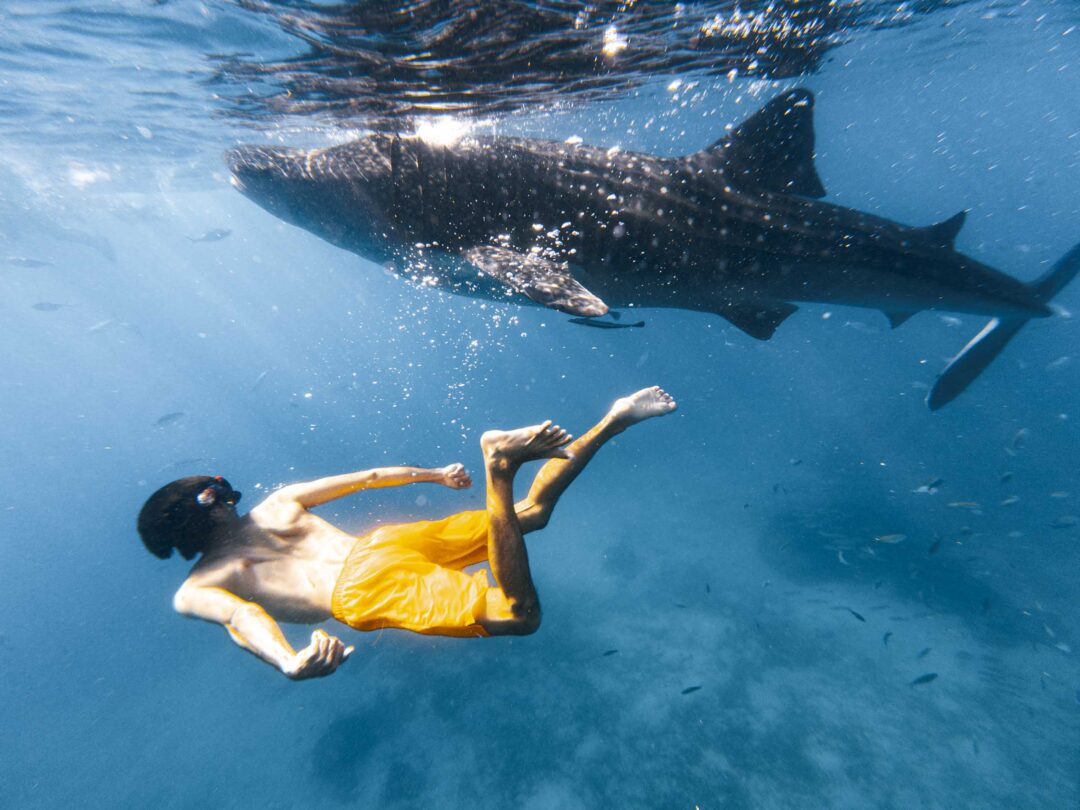

Great guide and not full of advertising like others.
Another quieter trip is the flower garden up in the mountains above Cebu then various attractions and viewpoints coming down.
That’s one we haven’t heard of. Thanks for the tip!
Useful update thanks will be there in the new year woohoo 🙌🏻
Yay! Have an amazing dream. We’re dreaming of Cebu!
thanks
You’re welcome! 🙂